Ned Vena
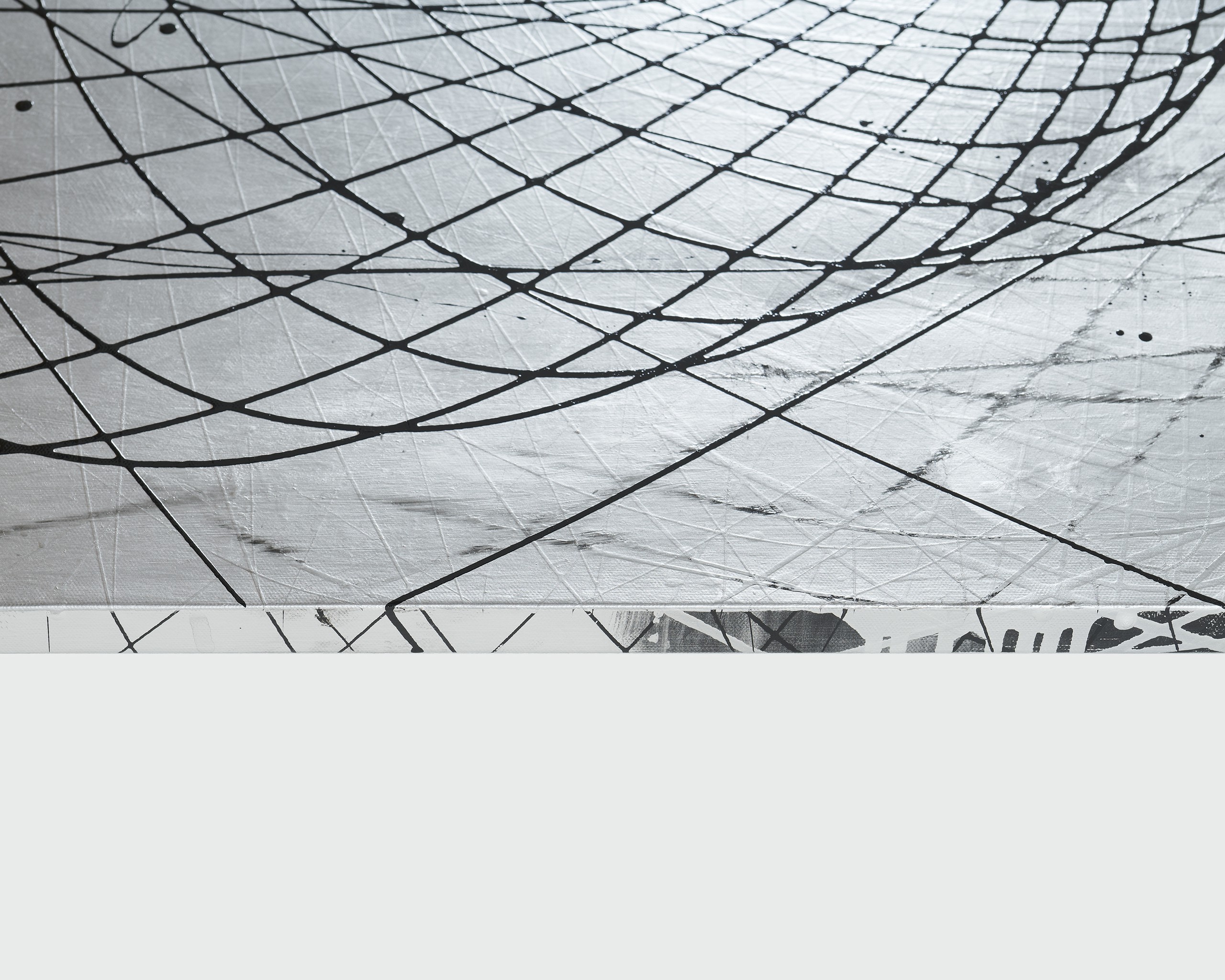
Detail view, Spiral, 2020, enamel on linen, 121.92 × 91.44 cm
Merging digital technology, industrial production, graffiti, and the handmade, Ned Vena makes paintings, sculptures, installations, and films through which he explores and, ultimately, upends notions of form, process, and concept in art making. Drawing inspiration from Minimalism, Op and Pop Art, and Frank Stella’s “Black Paintings,” he creates compositions out of an assortment of non-fine art materials—including vinyl, spray rubber, security glass, and commercial ink—which he covers with V-shaped, gridded lines, intentionally marred with a variety of surface imperfections. Vena begins on the computer, working out his angular grids, which he then transfers to canvases with vinyl stencils. He has also affixed these stencils directly onto gallery walls and other surfaces, blurring the boundaries between art and the everyday, and the unique, precious object and mass production.
Ned Vena (b.1982, USA) is a contemporary artist, primarily known for his abstract paintings and unusual choice of media. He completed the AICAD New York Studio Program in 2004, and earned his BFA from Tufts University and the School of the Museum of Fine Arts in 2005. His work has been the subject of numerous solo shows, including at the Cohan and Leslie Gallery in New York, NY; Galerie Gebr. Lehmann in Berlin, Germany; Michael Benevento in Los Angeles, CA; White Flag Projects in St. Louis, MO; and Clifton Benevento in New York, NY. Vena lives and works in New York.
Spirals
Société, Berlin 2021
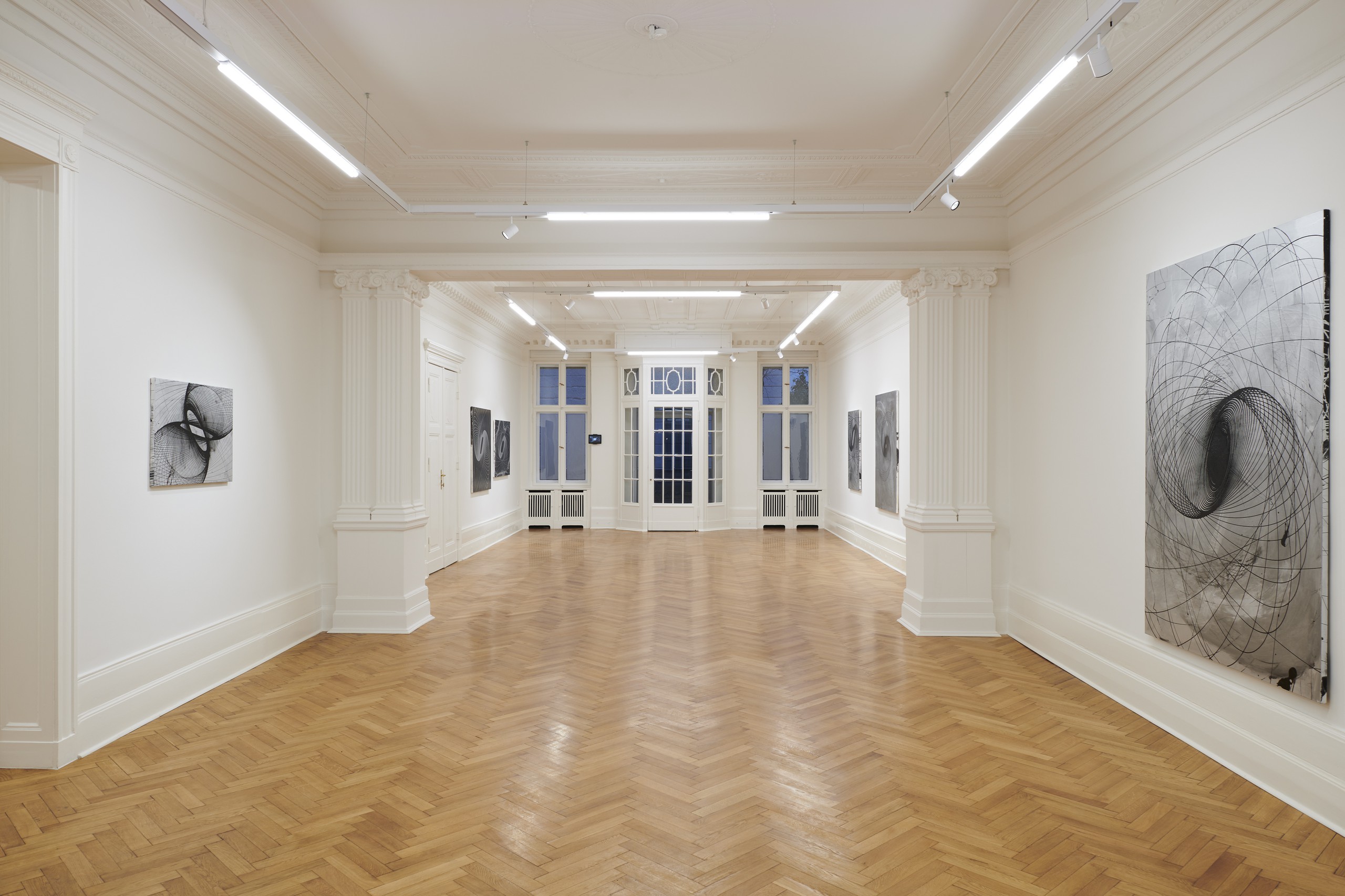
Installation view, Spirals, Société, Berlin, 2021
Spherical motion lies at the very heart of creation. Vena uses the motif of the “spiral” to establish a relationship between the formal qualities of his paintings and the popular associations sparked by the term, which simultaneously encompass the mathematical perfection of a whirlpool, the intuitive, ecstatic states of spiritual devotion, and the destructiveness of the downward spiral. The spiral vortex radiates outwards, while simultaneously drawing itself inwards—infinitely and eternally. Vena’s paintings on linen take the form of crisp, perfect vortices—neat geometric constructions layered atop washy swathes of grey and white monochrome. Others, executed in enamel paint on Yupo paper, have a more frenetic, darker feeling: bits of graffiti peek through thin black lines interrupted by thick patches of silver paint. Although fragments of spirals reveal themselves in these works, bereft of the perfection we typically expect from spirals, whether appearing in the natural world or a math textbook, these works somehow seem closer to how an emotional spiral feels: layered, complicated, messy.
To make his spirals, Vena created a pendulum by suspending a container of paint from the ceiling with a string, which was then swung in a circular motion. Vortex-like spiral patterns ensued from the paint dripping onto the surface below. The internet teems with examples of such paintings: videos by Sunday painters on YouTube, tutorials by Martha Stewart, archival photographs of Max Ernst with his own pendulum works. As Vena himself notes in a text that he wrote to accompany the exhibition, “It reminded me of so-called Zombie Formalism, which I have been involved with, and I thought that was funny. Once put into motion they paint themselves. Surrender to forces beyond my control produces the paintings.” Of course, there is a long history of artists painting with objects or delegating the act of painting to a proxy. Such experiments were typically inspired by an interest in the convergence of esotericism and mathematics, or simply a desire to shake things up. Yet Vena’s approach seems less an act of violence—think of de Saint Phalle shooting paint or Shimamoto hurling paint filled vases at the canvas—than an act of surrender. If we think of Harold Rosenberg’s writings on action painting, in which he defines the canvas as “not a picture, but an event” and “an arena in which to act,” perhaps Vena’s spirals are spaces not to act—a state of pure flow. This going with the flow can’t help but reflect in some way on the year in which they were made, a time that served us best when we just sat back and let it run its course and didn’t try to intervene too much. A time perhaps experienced as a spiral, a groundhog’s day, an ever-cycling sameness. Yet within such repetitions lie the possibility of catharsis, of release.
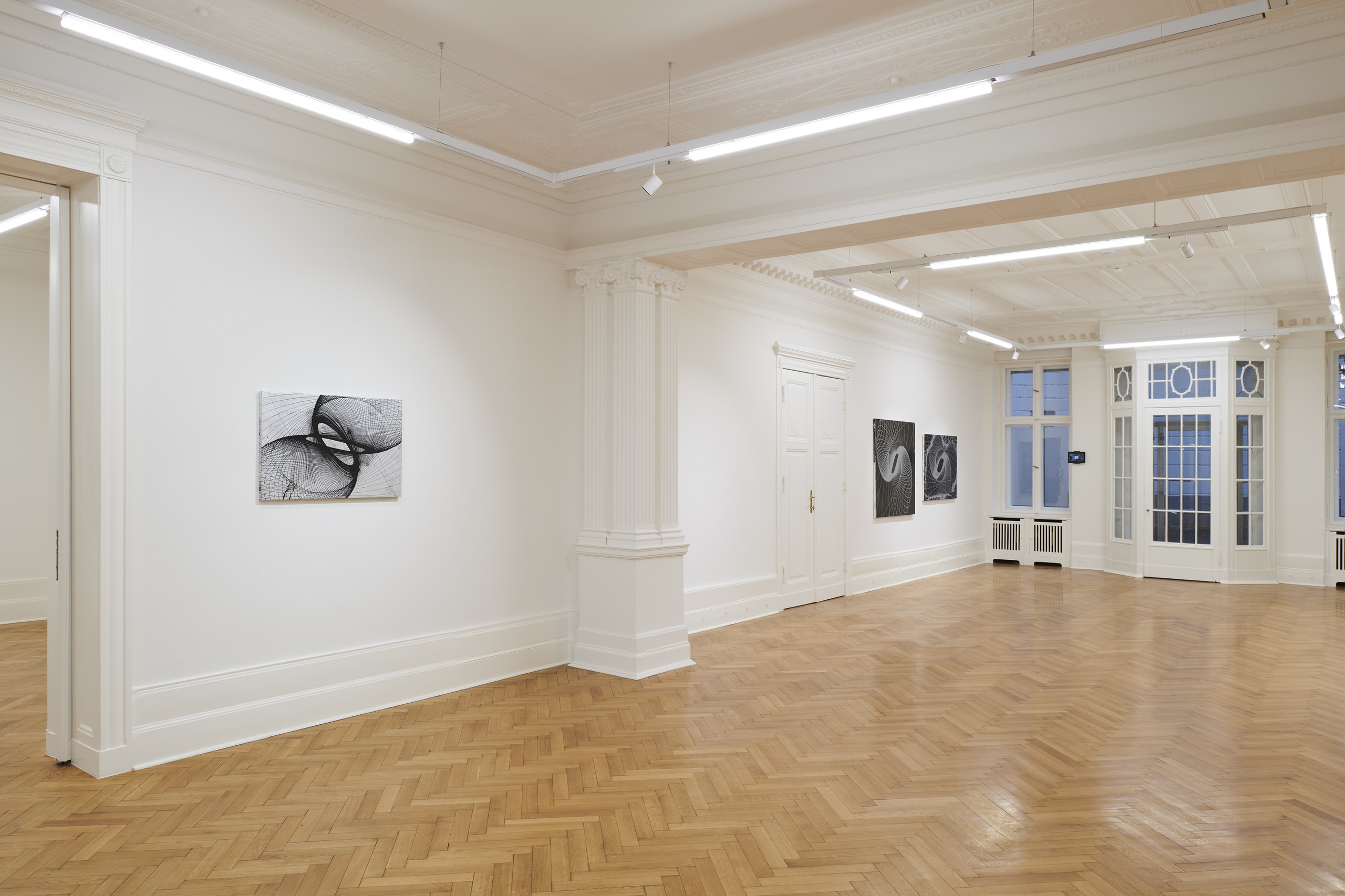
Installation view, Spirals, Société, Berlin, 2021
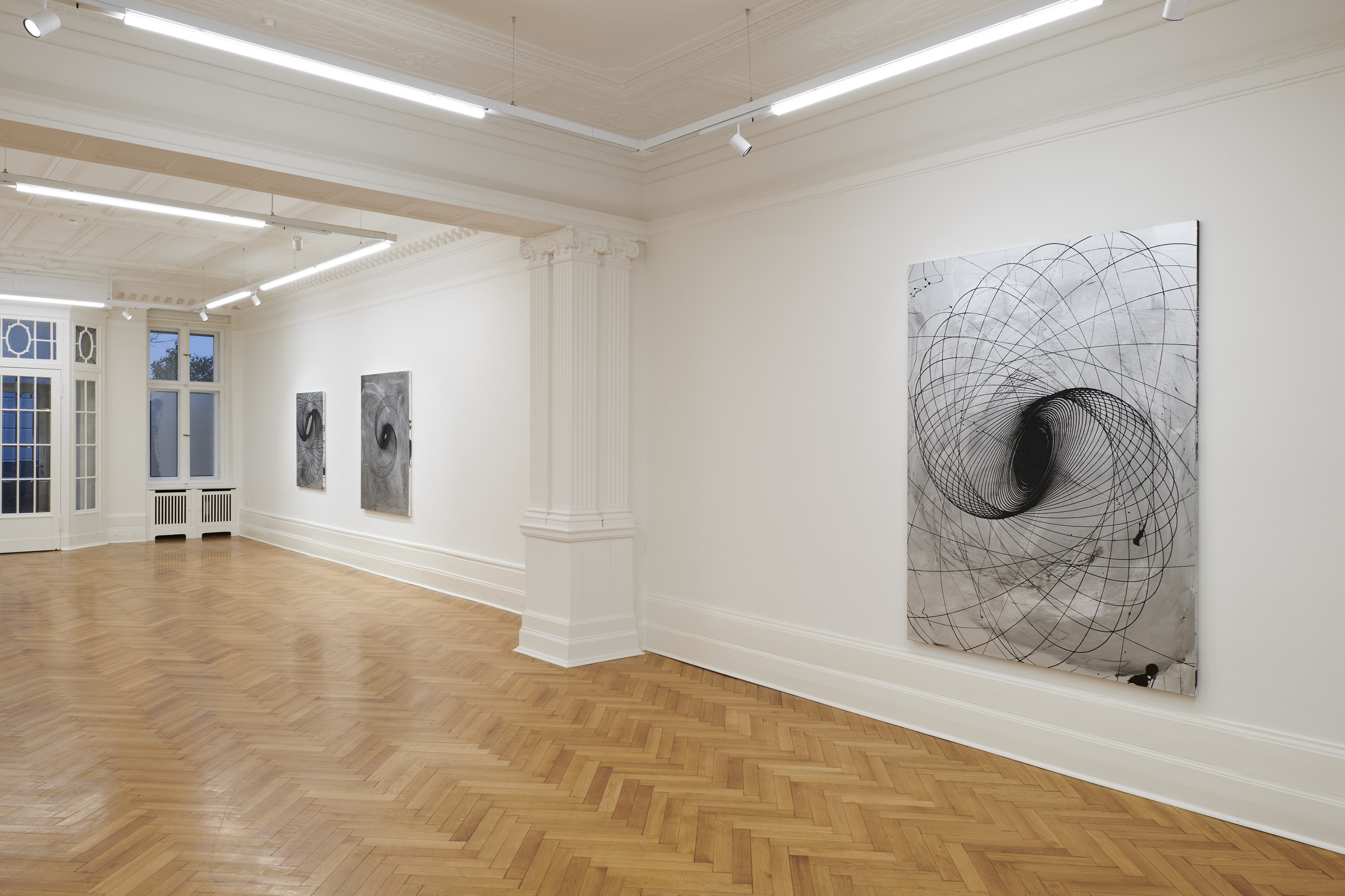
Installation view, Spirals, Société, Berlin, 2021
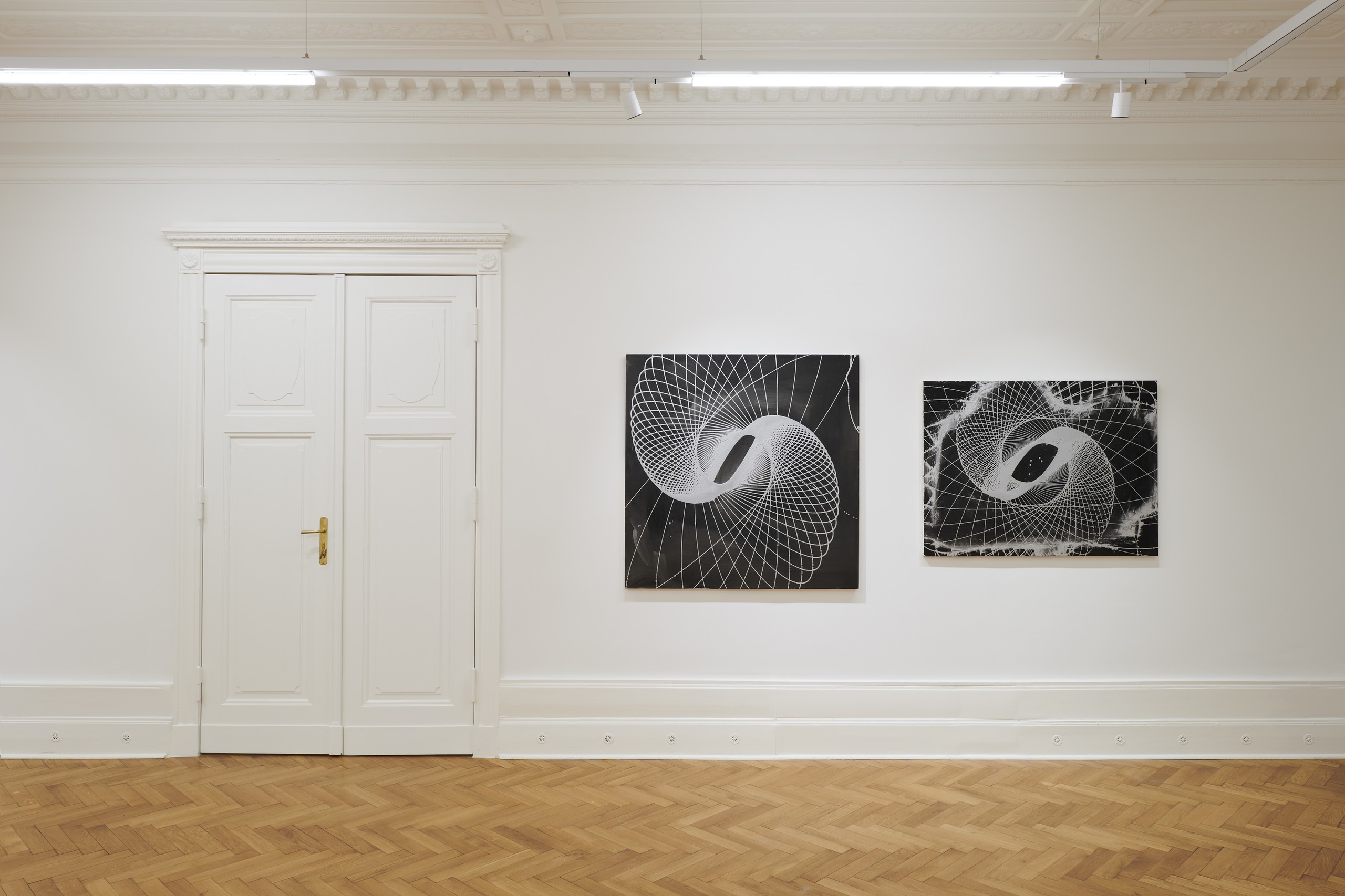
Installation view, Spirals, Société, Berlin, 2021
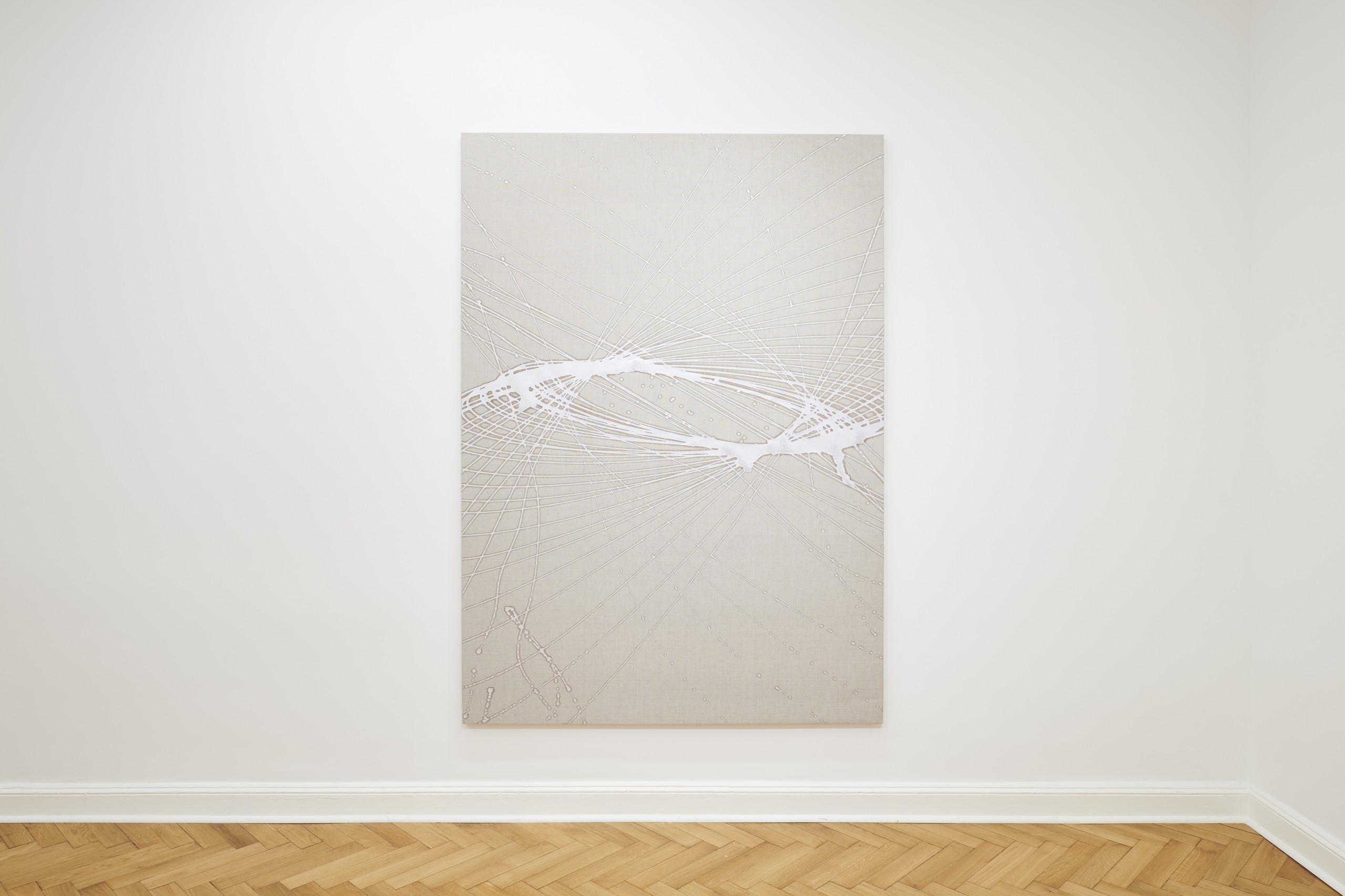
Installation view, Spirals, Société, Berlin, 2021
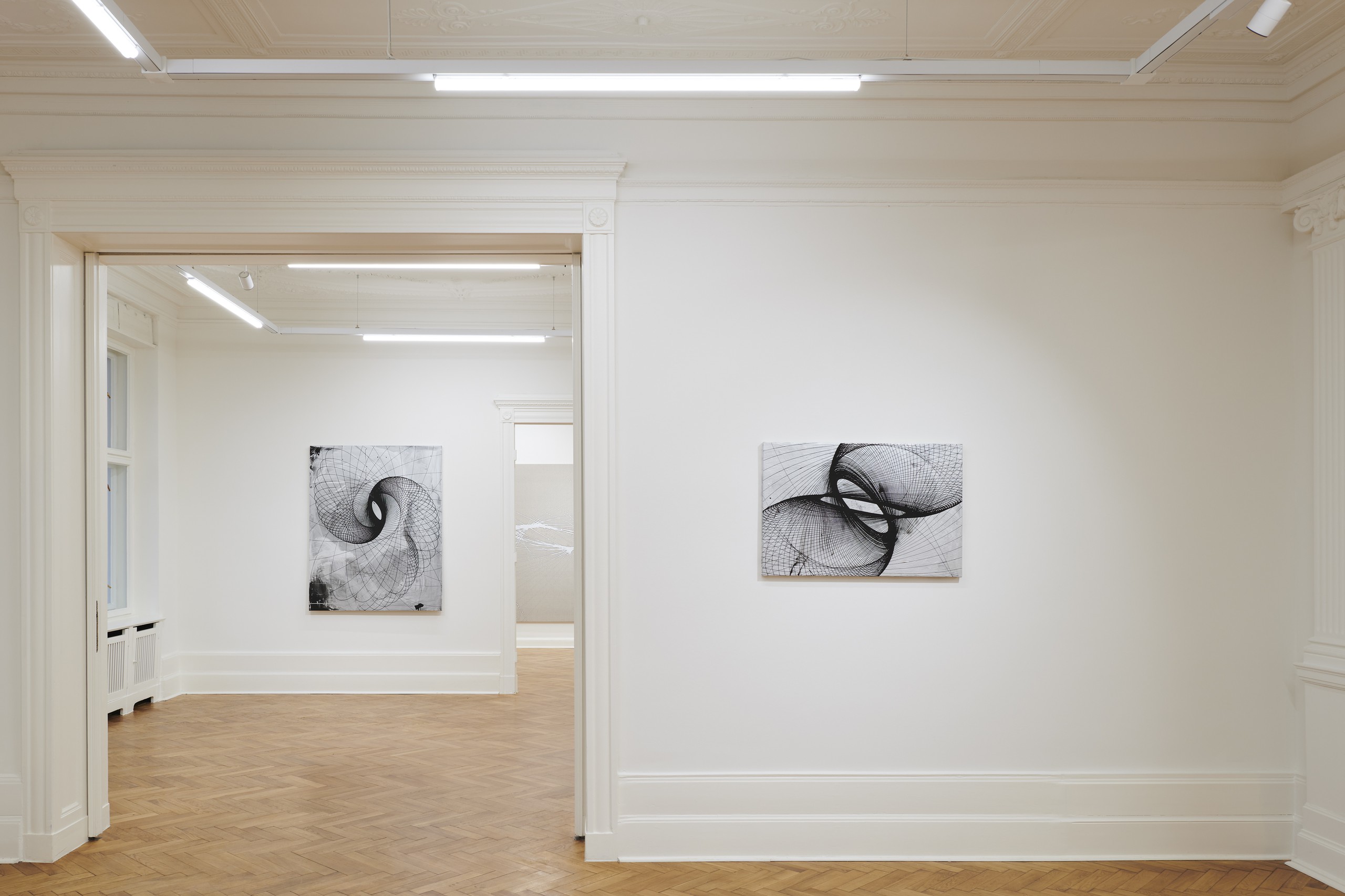
Installation view, Spirals, Société, Berlin, 2021
Hell on Earth
Gavin Brown's Enterprise, New York, 2018
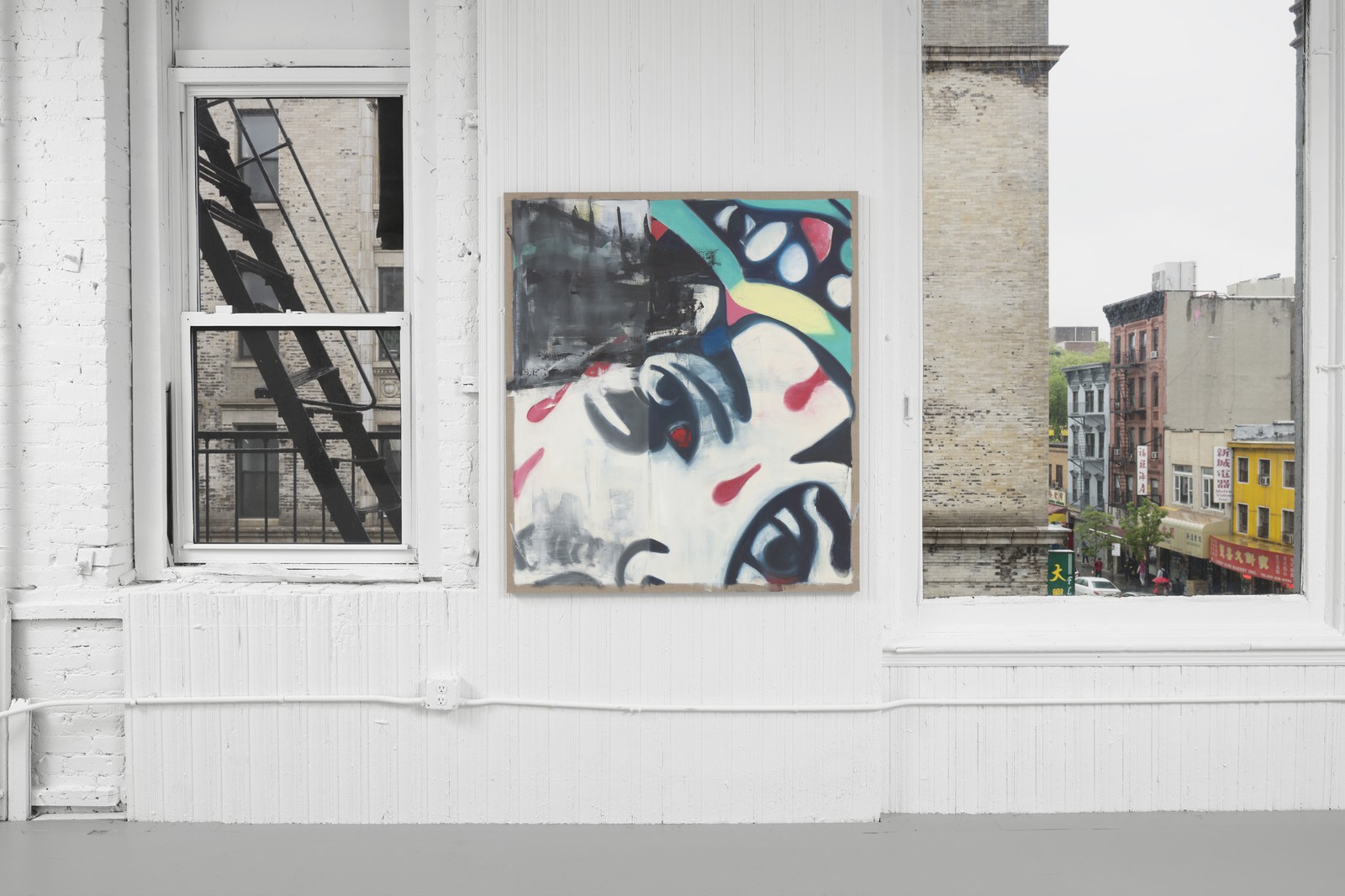
Installation view, Hell on Earth, Gavin Brown's Enterprise, New York, 2018
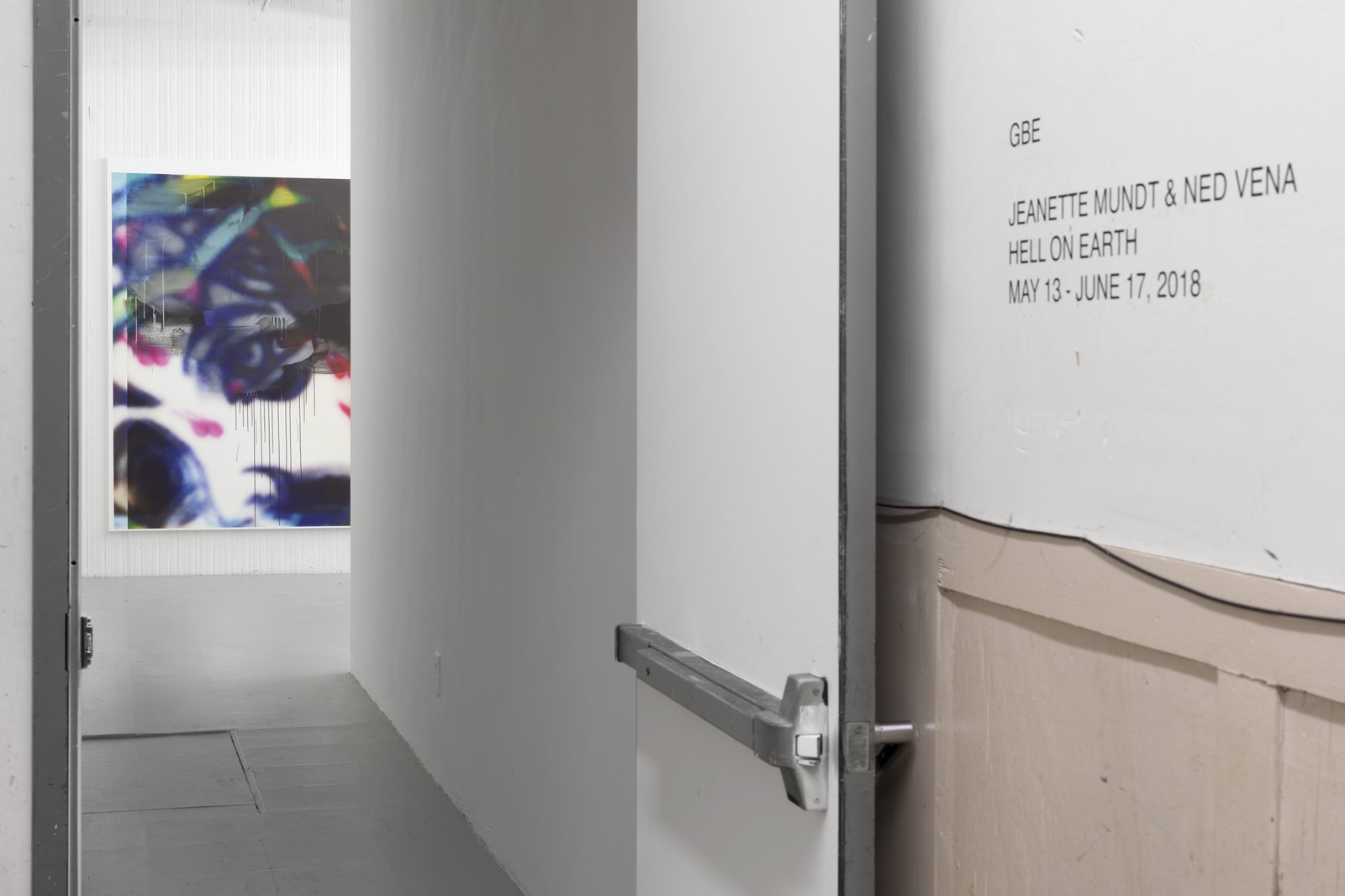
Installation view, Hell on Earth, Gavin Brown's Enterprise, New York, 2018
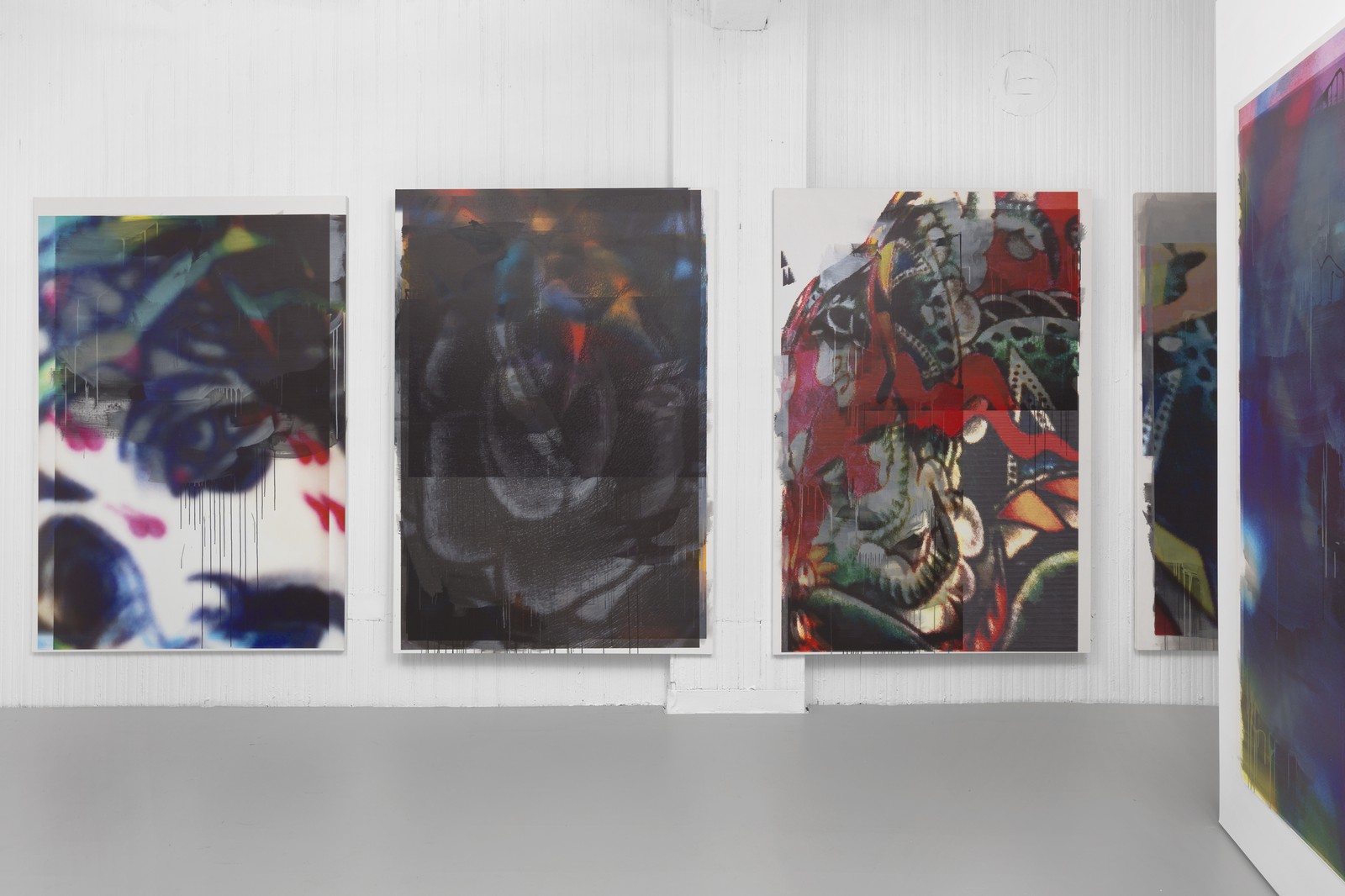
Installation view, Hell on Earth, Gavin Brown's Enterprise, New York, 2018
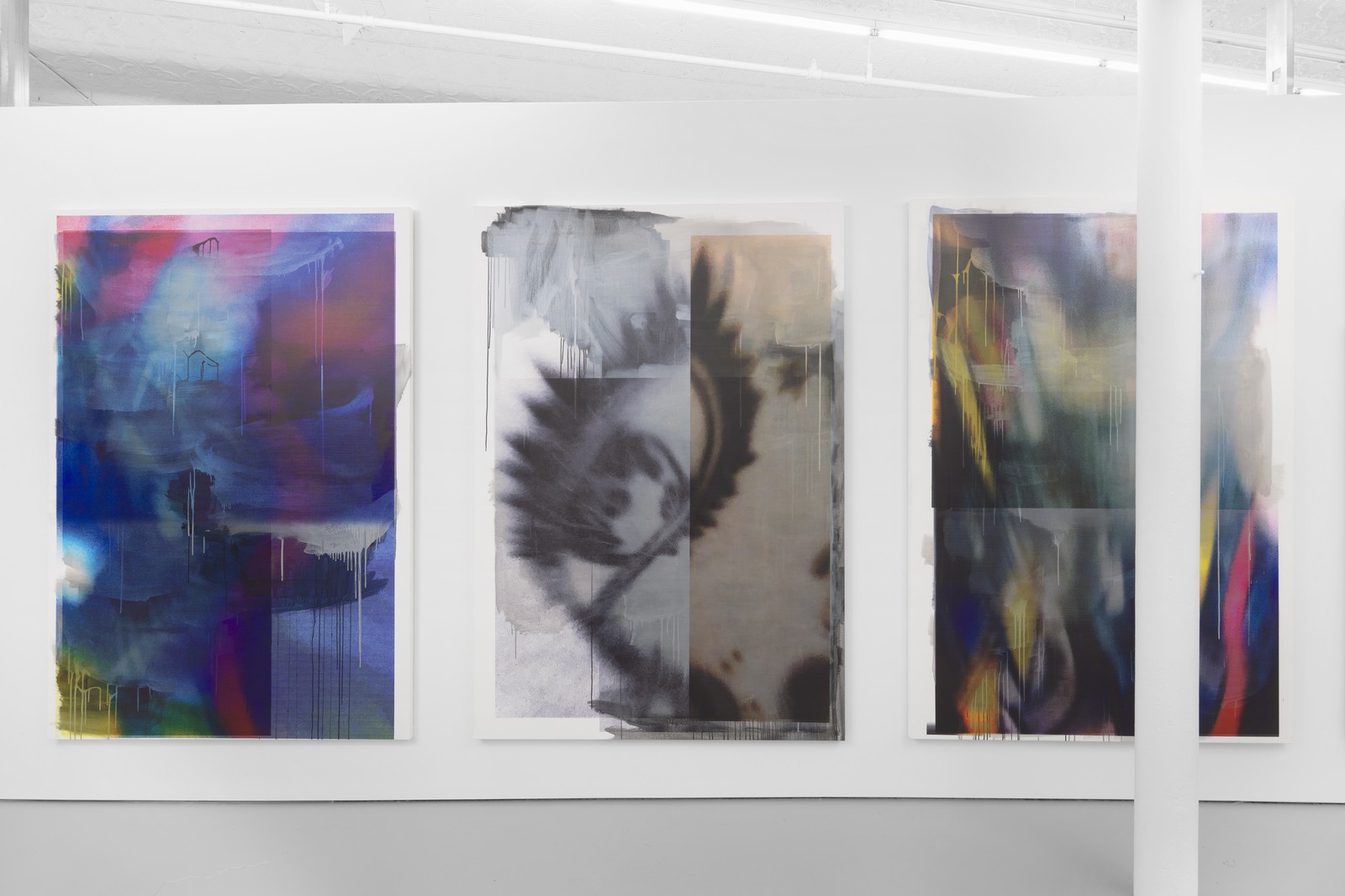
Installation view, Hell on Earth, Gavin Brown's Enterprise, New York, 2018
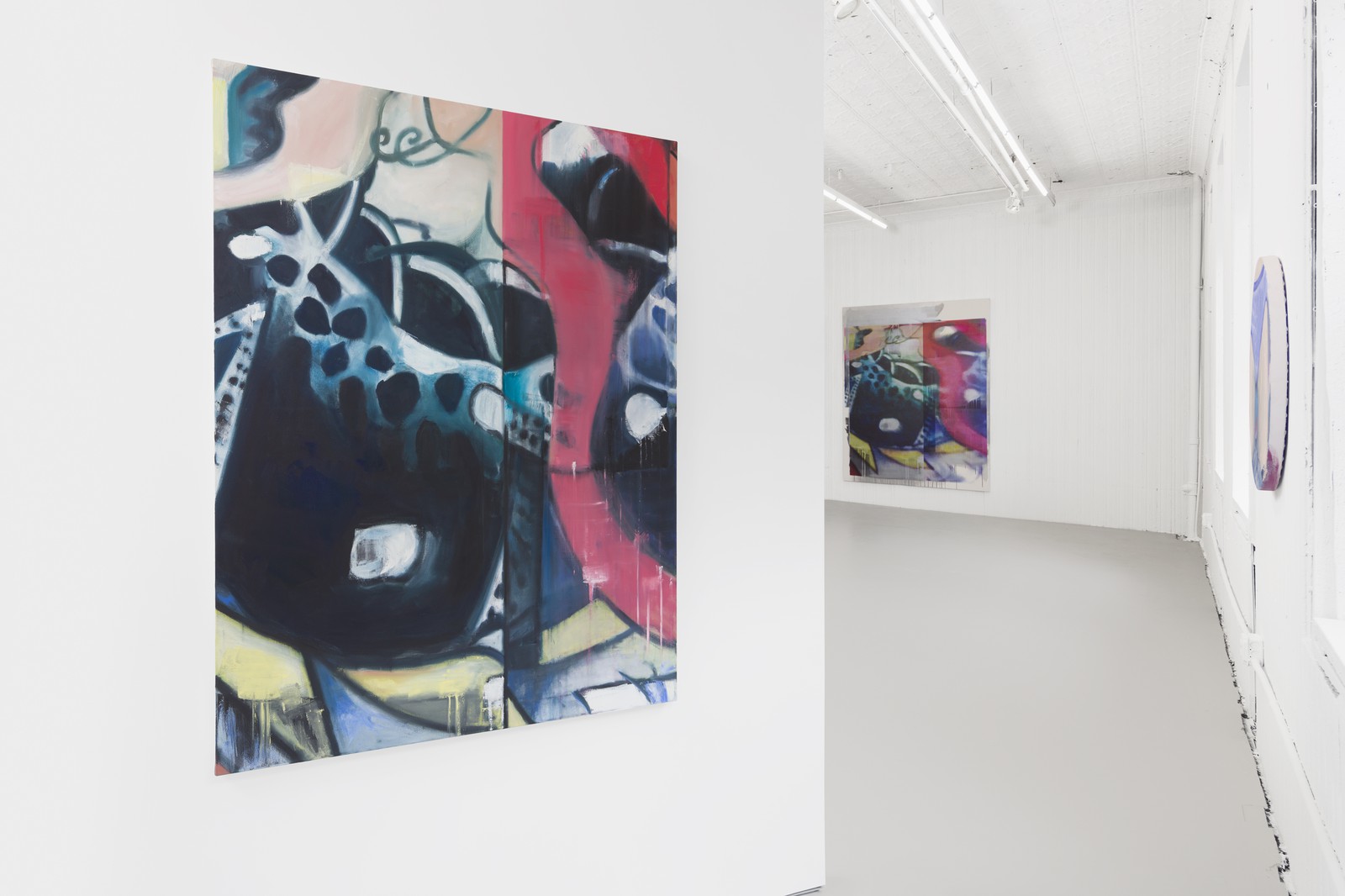
Installation view, Hell on Earth, Gavin Brown's Enterprise, New York, 2018
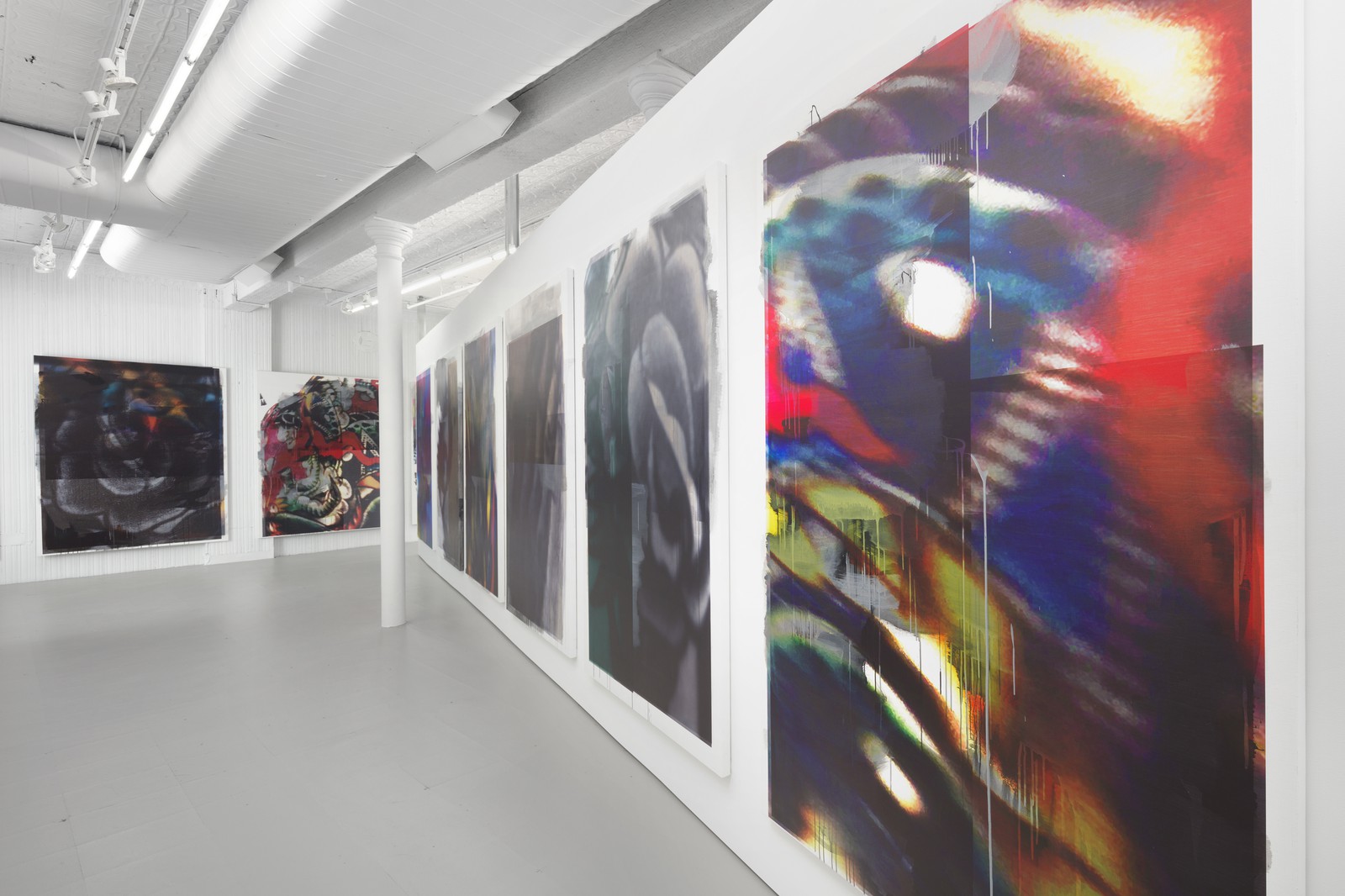
Installation view, Hell on Earth, Gavin Brown's Enterprise, New York, 2018
FACTS
Project Native Informant, London, 2018
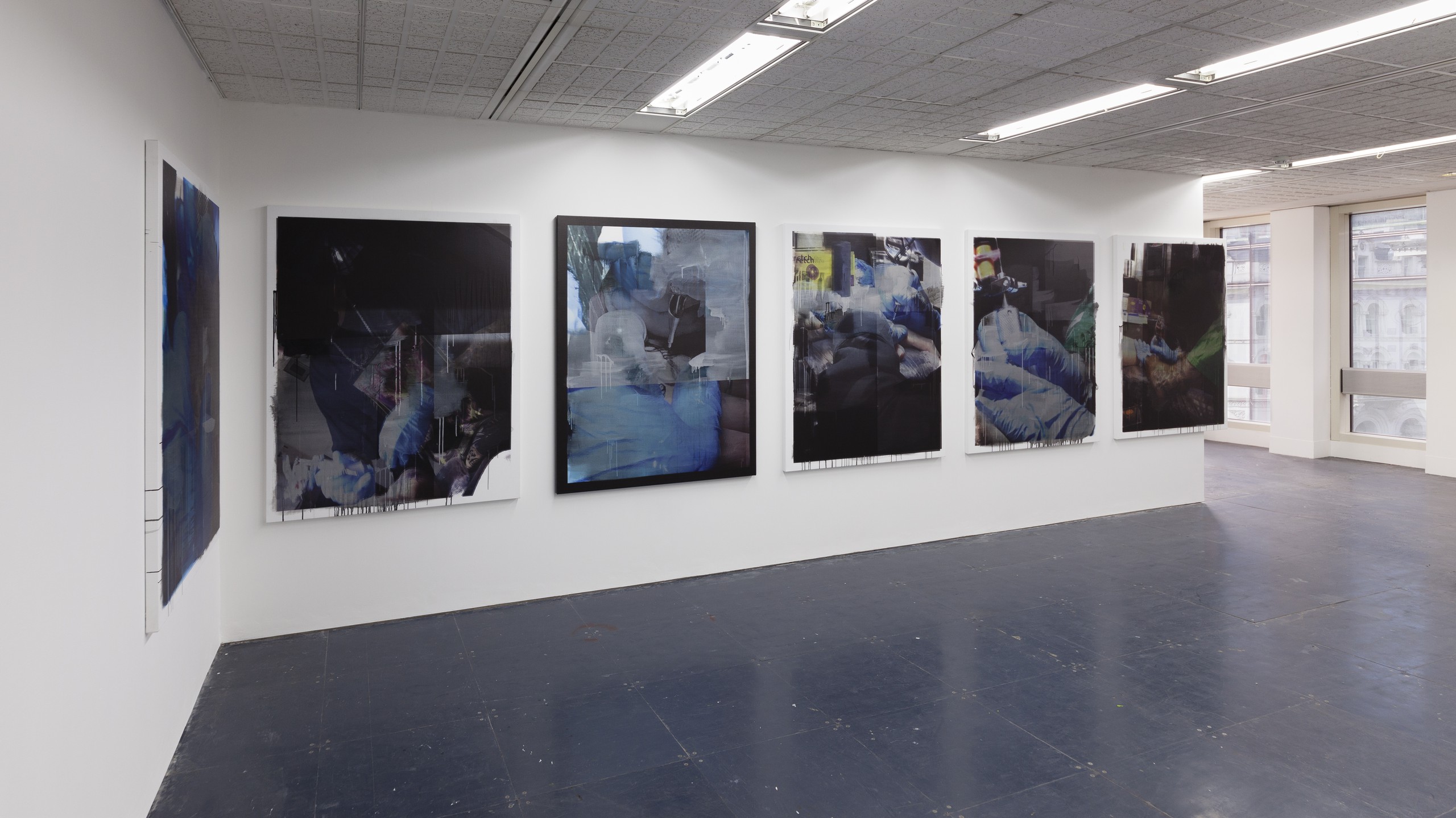
Installation view, FACTS, Project Native Informant, London, 2018
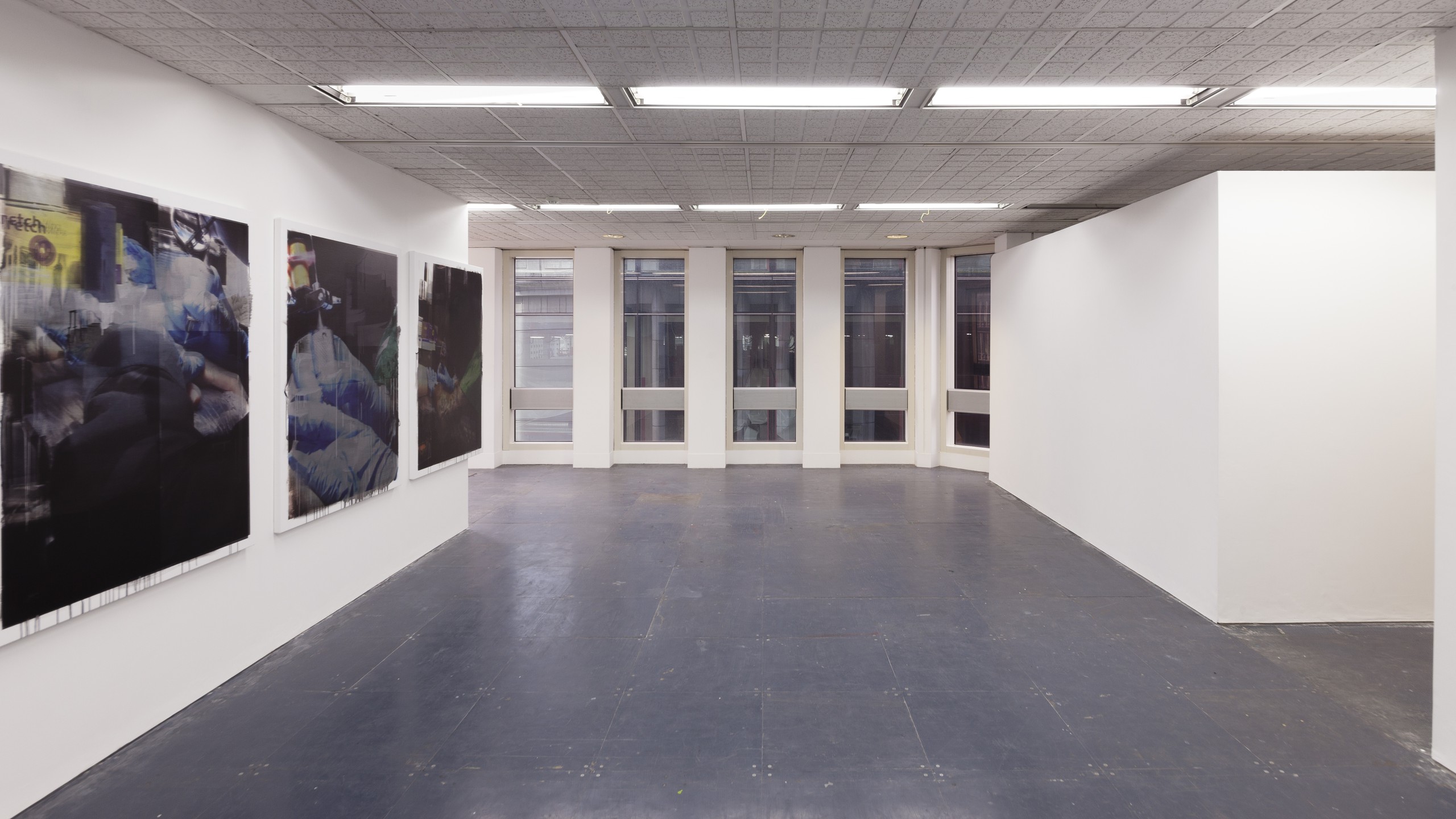
Installation view, FACTS, Project Native Informant, London, 2018
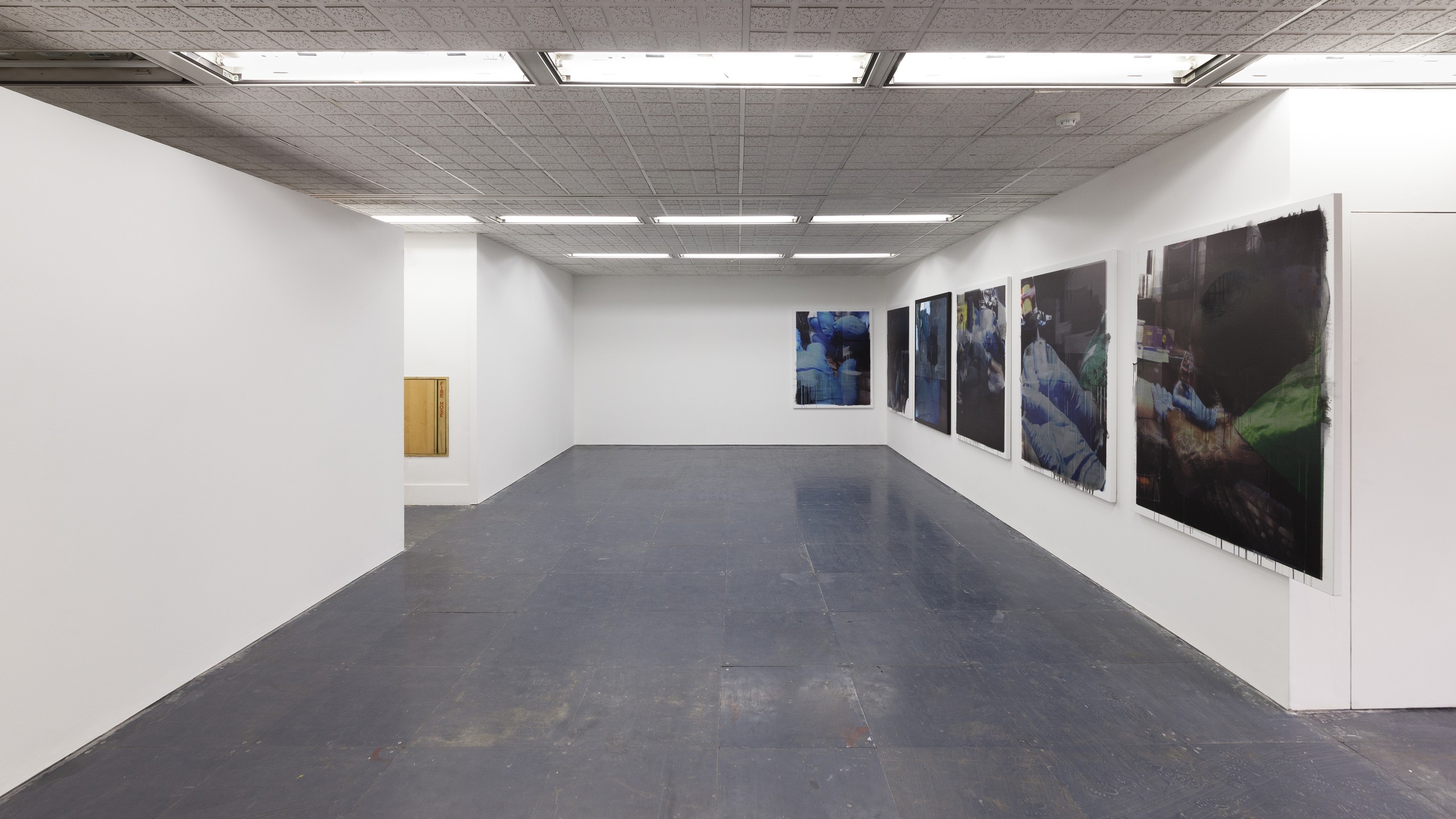
Installation view, FACTS, Project Native Informant, London, 2018
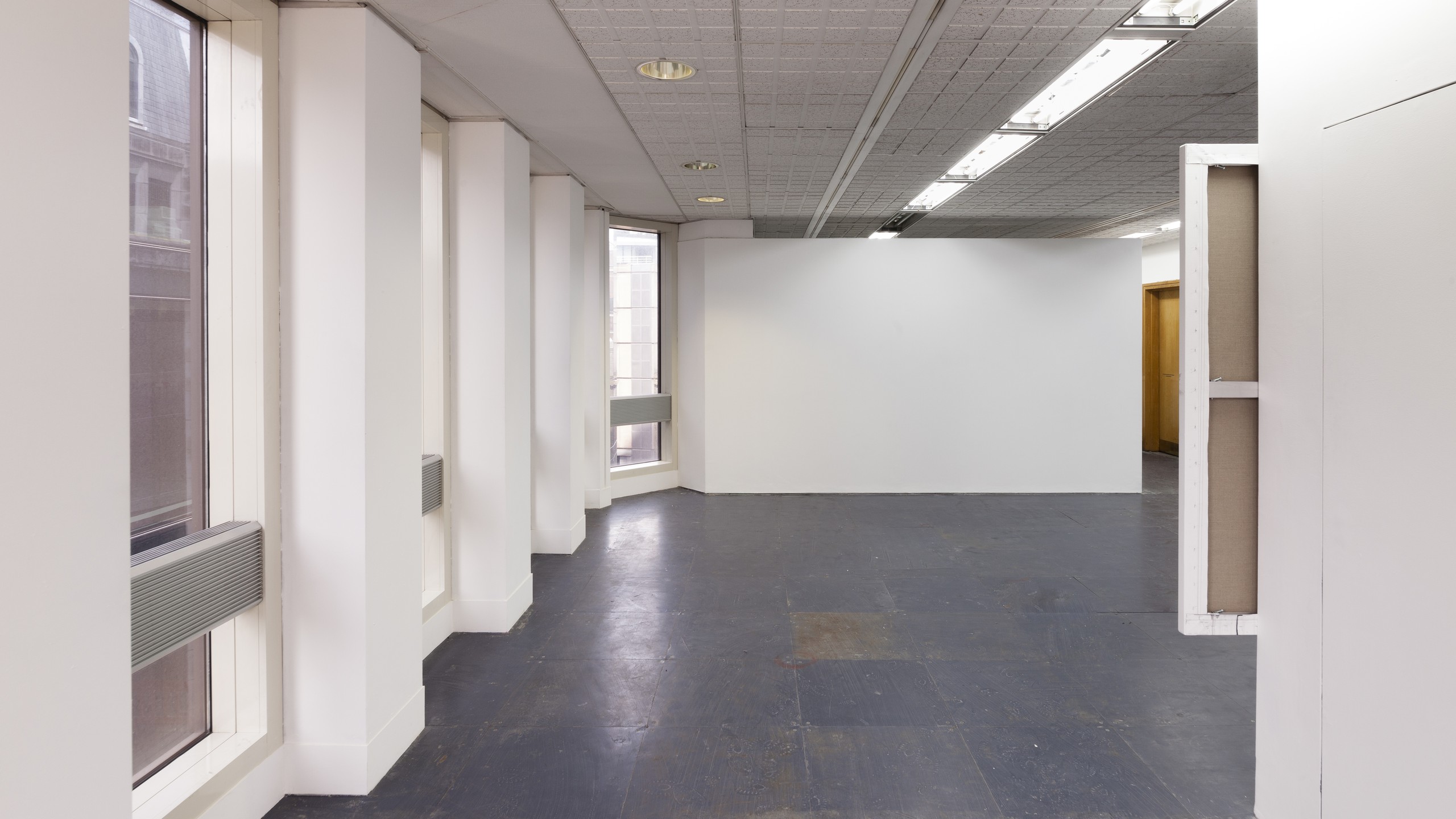
Installation view, FACTS, Project Native Informant, London, 2018
Art Basel Miami Beach
Miami, 2017
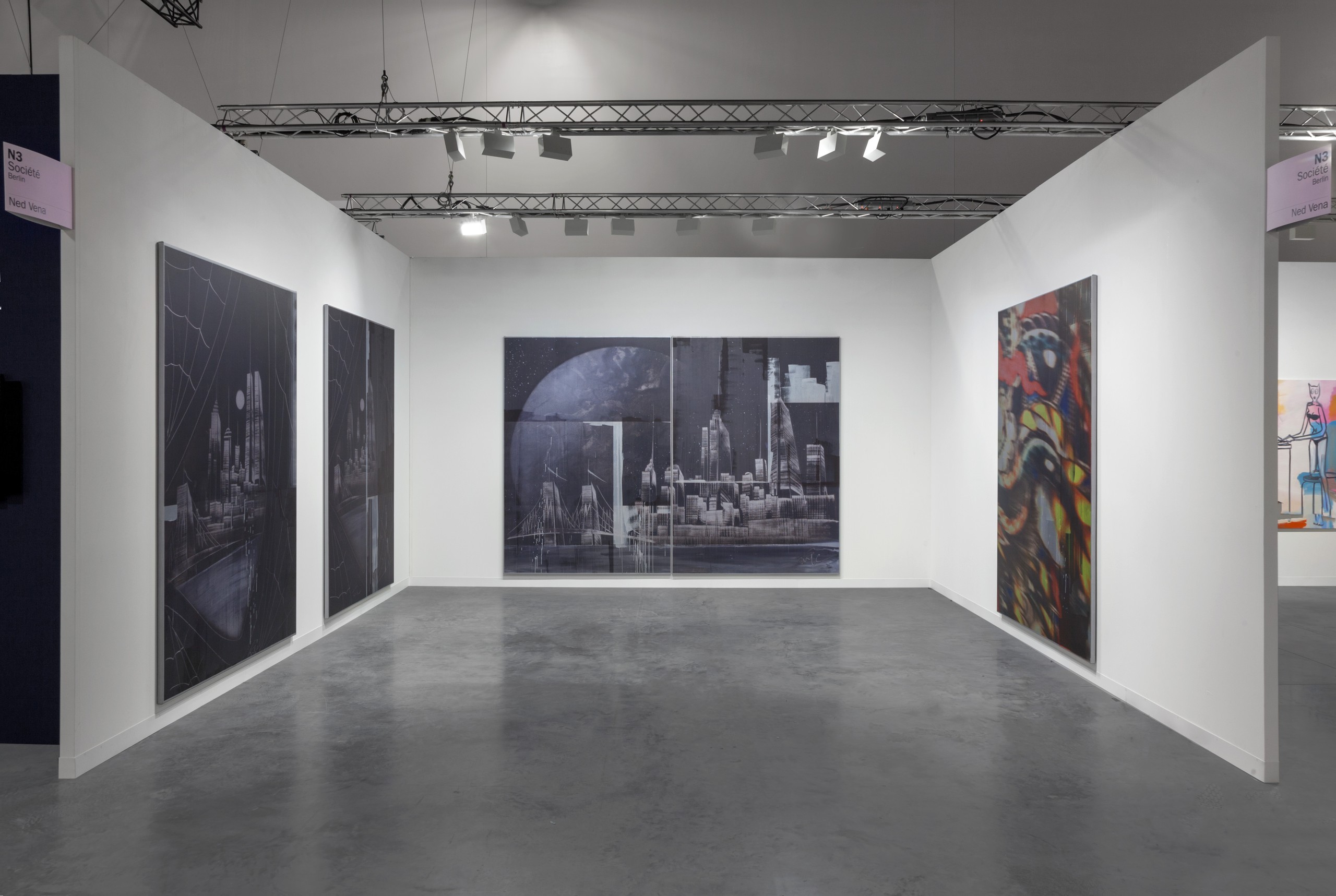
Installation view, Art Basel Miami Beach, Miami, 2017
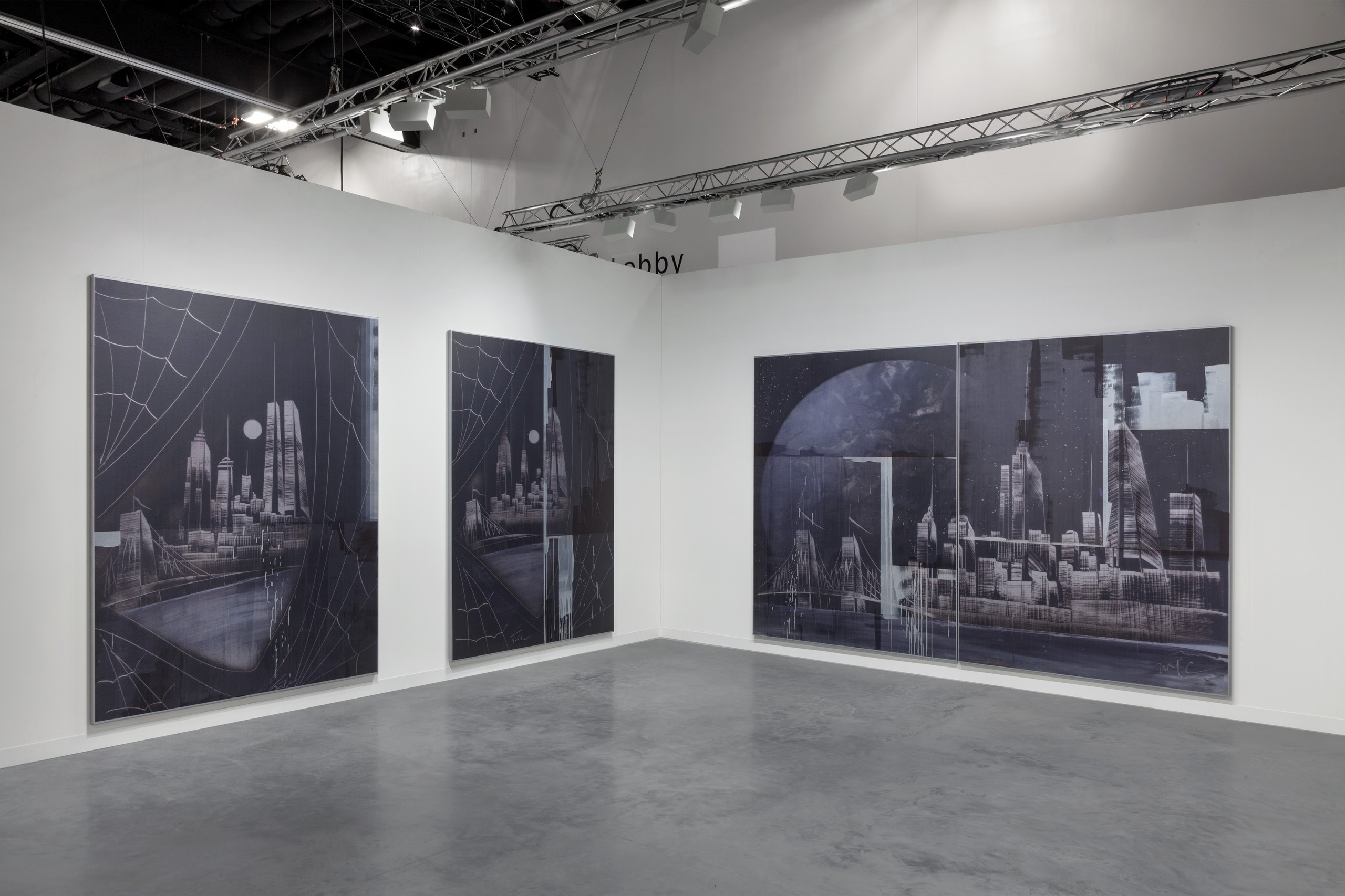
Installation view, Art Basel Miami Beach, Miami, 2017
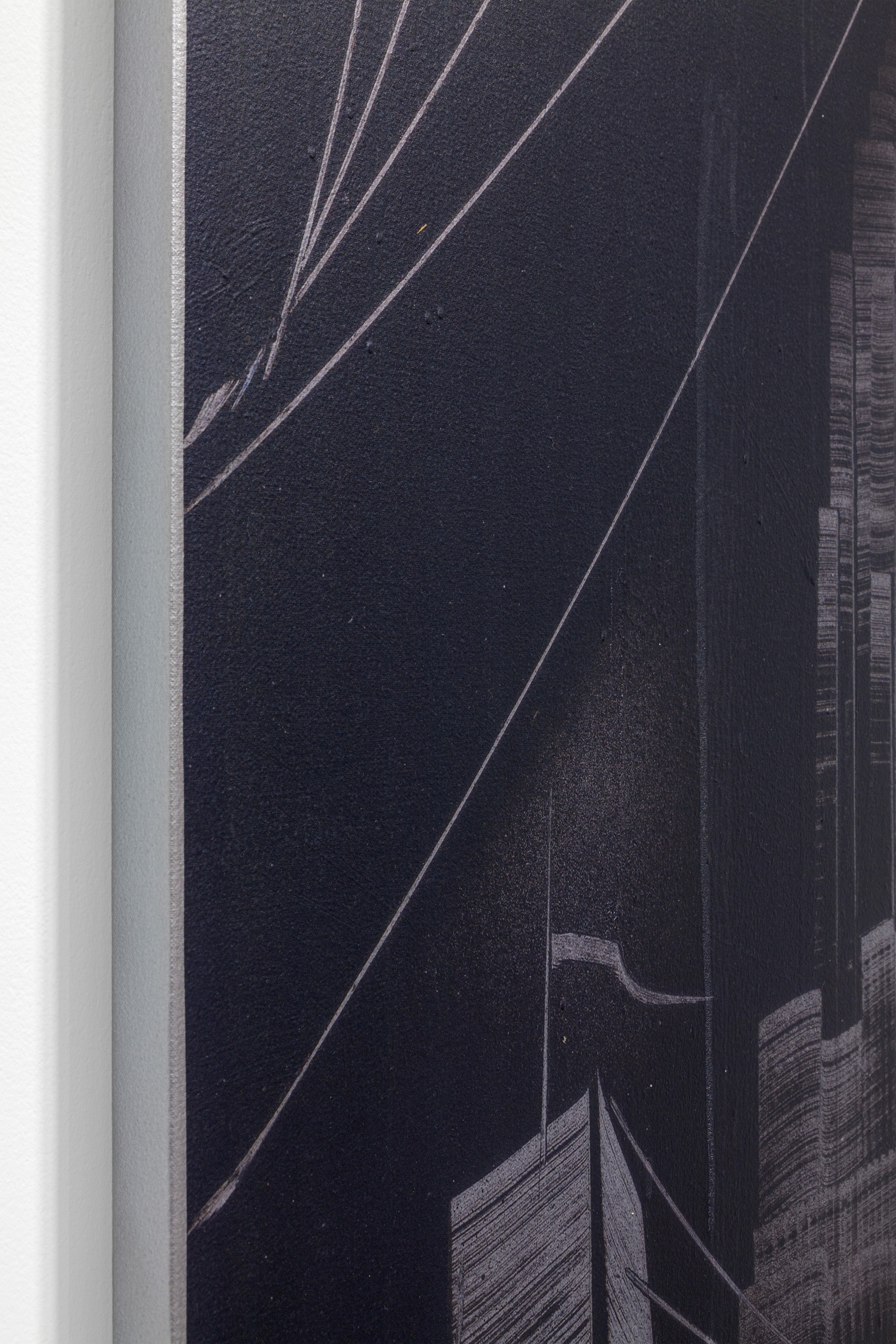
Detail view, Manhattan at the end of 2017 (Spiderman with Twin Towers), 2017, acrylic and UV Cured Ink on canvas, 254 × 190.5 × 3 cm
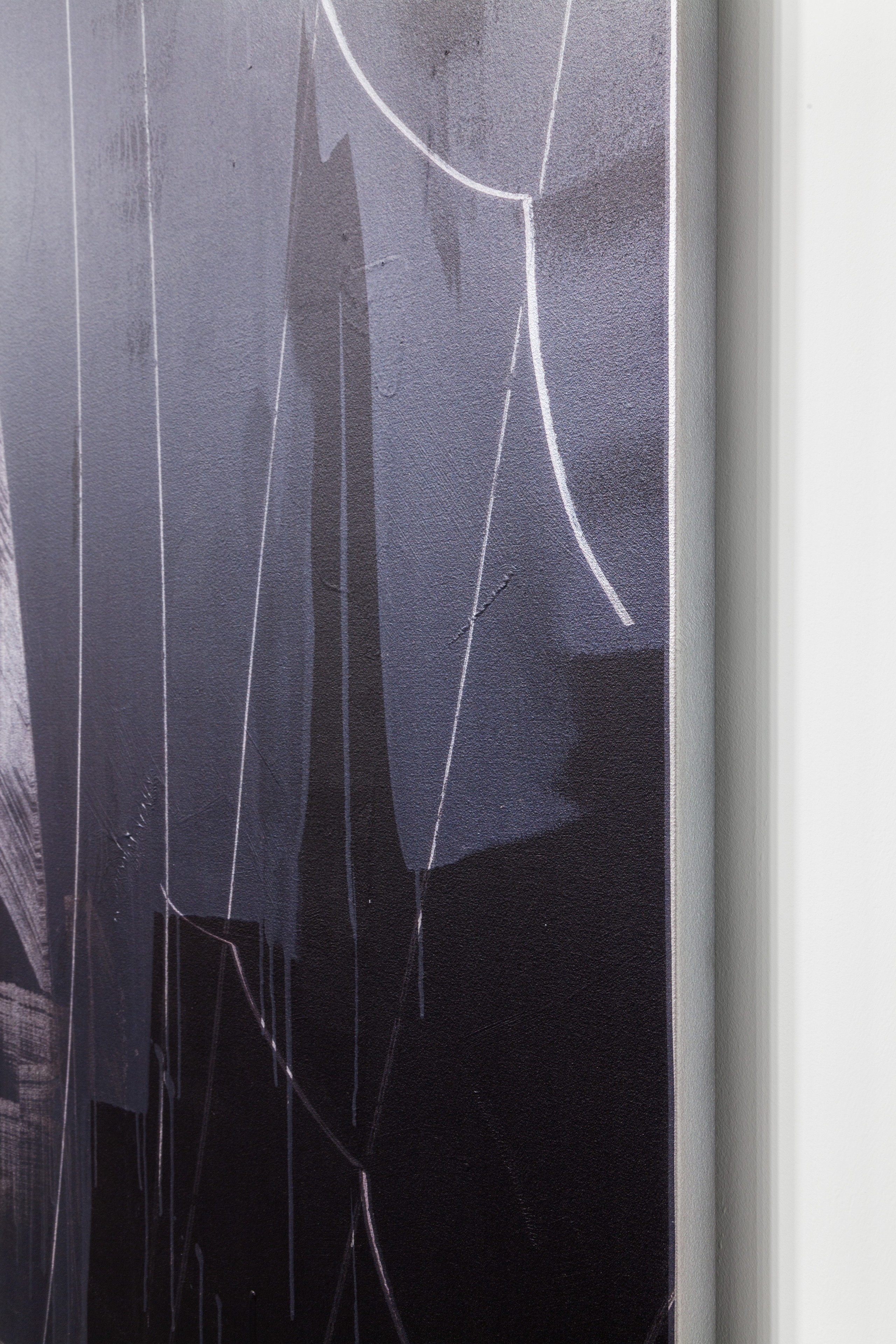
Detail view, Manhattan at the end of 2017 (Spiderman with Twin Towers), 2017, acrylic and UV Cured Ink on canvas, 254 × 190.5 × 3 cm
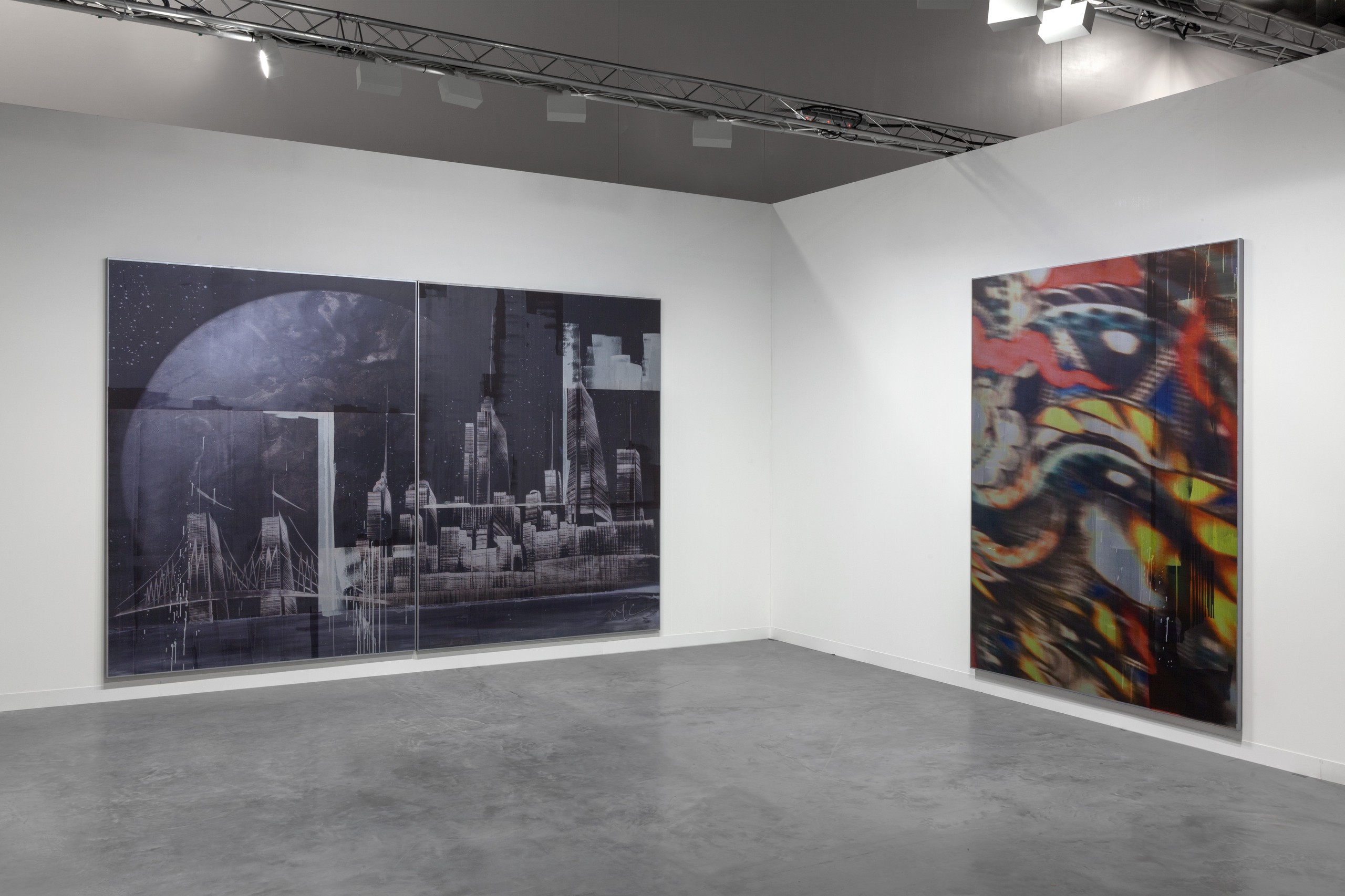
Installation view, Art Basel Miami Beach, Miami, 2017
6817 Melrose X SOCIÉTÉ
6817 Melrose, Los Angeles, 2017
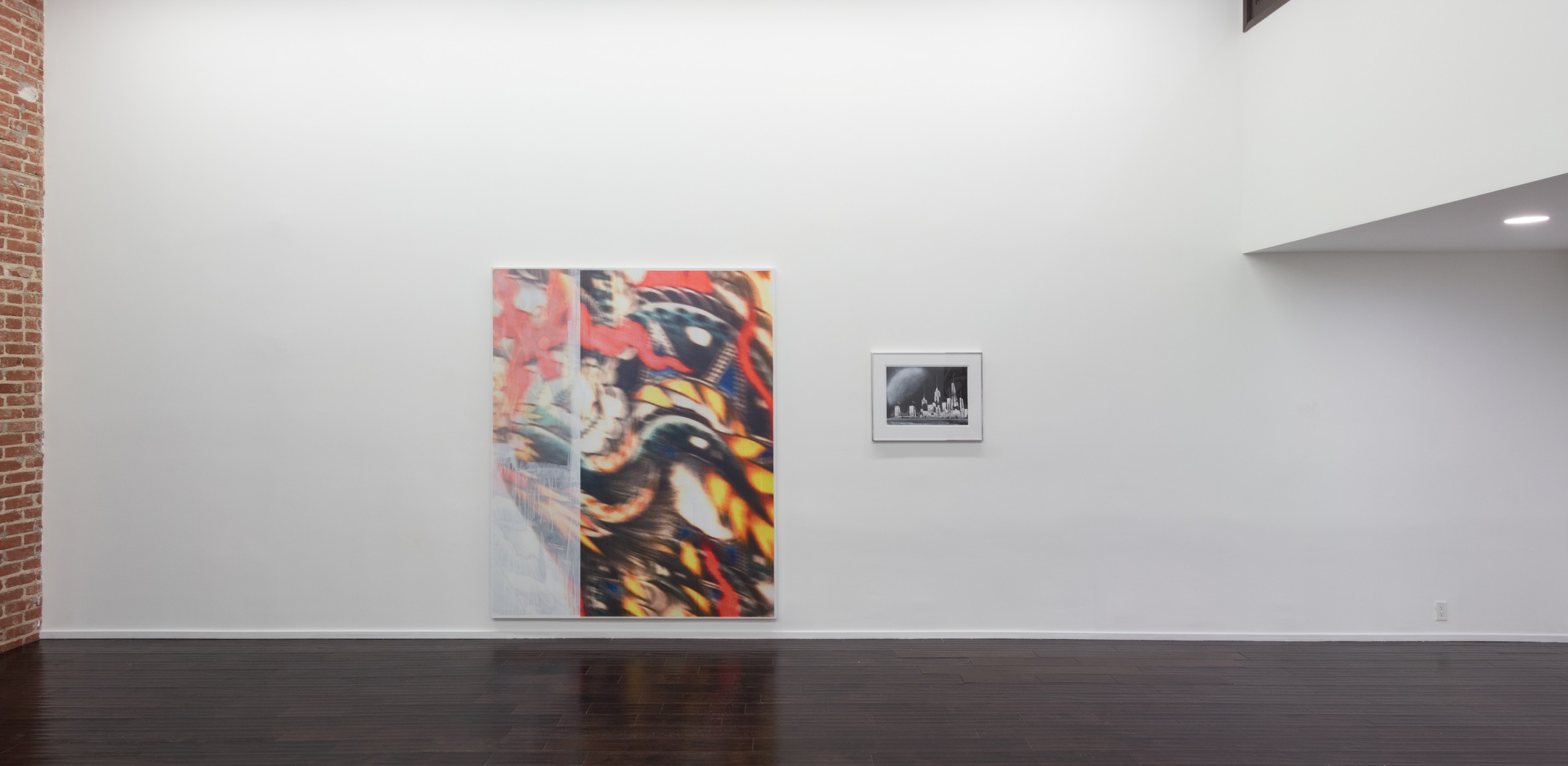
Installation view, 6817 Melrose X SOCIÉTÉ, 6817 Melrose, Los Angeles, 2017
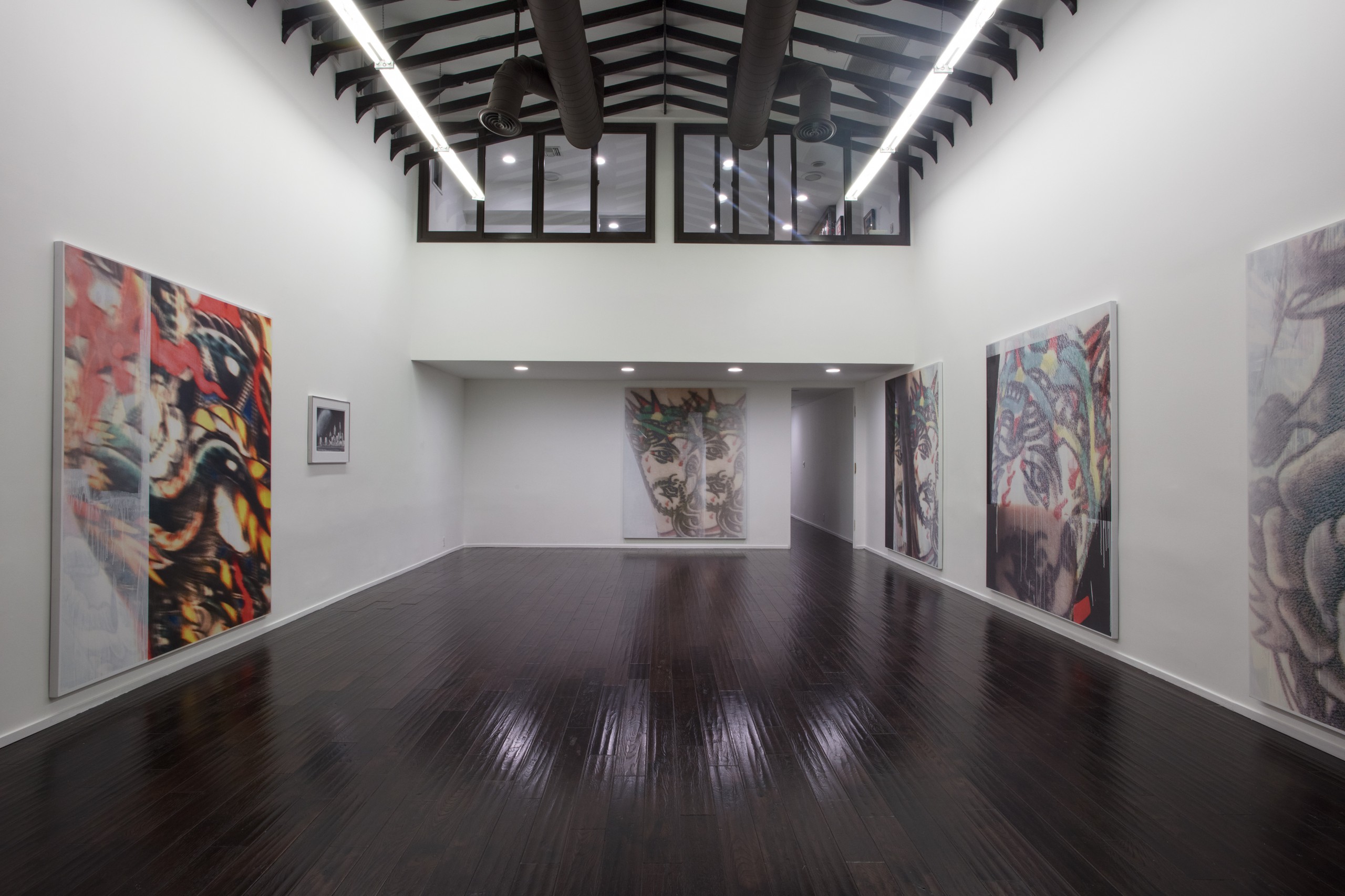
Installation view, 6817 Melrose X SOCIÉTÉ, 6817 Melrose, Los Angeles, 2017
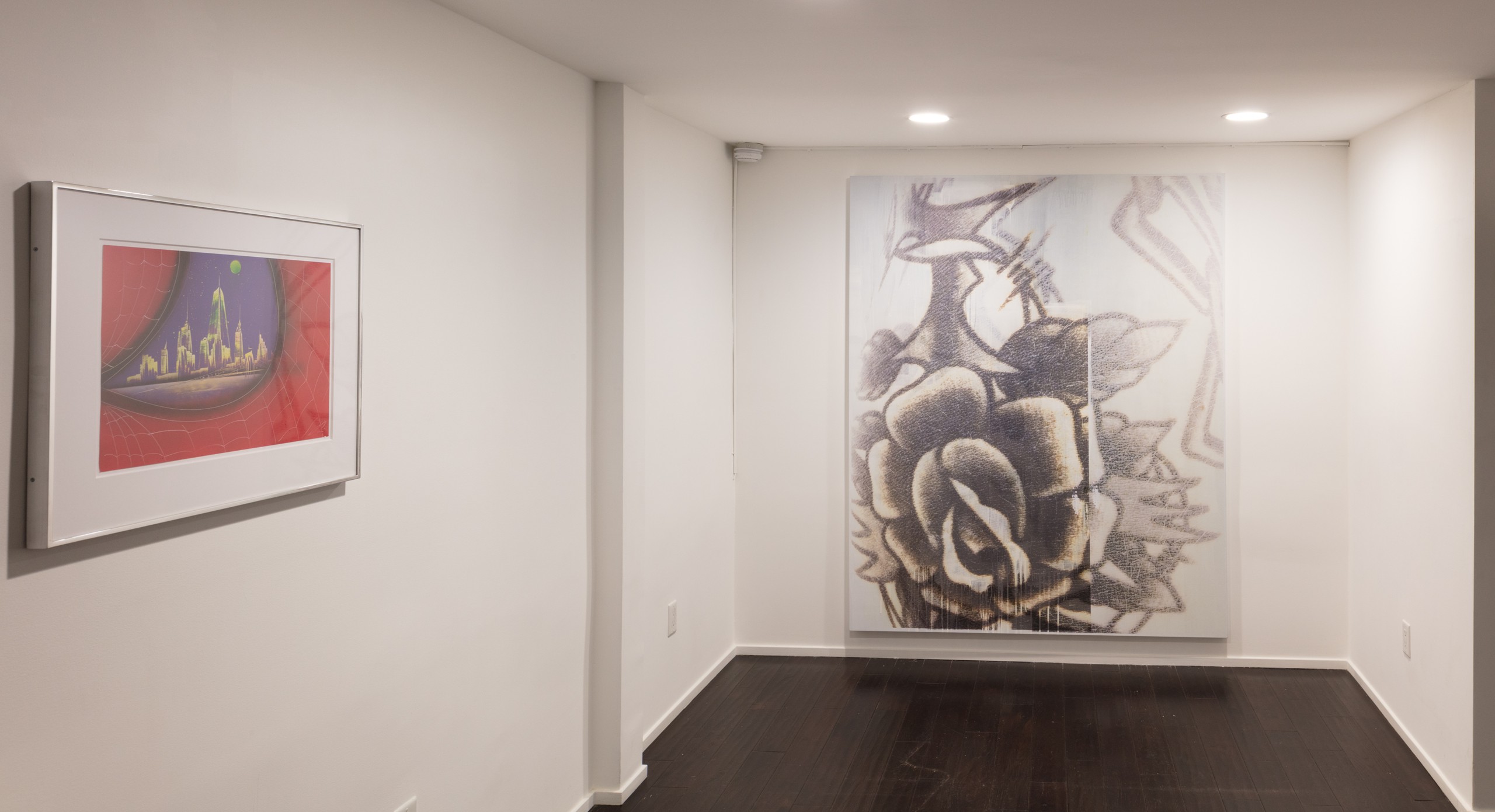
Installation view, 6817 Melrose X SOCIÉTÉ, 6817 Melrose, Los Angeles, 2017
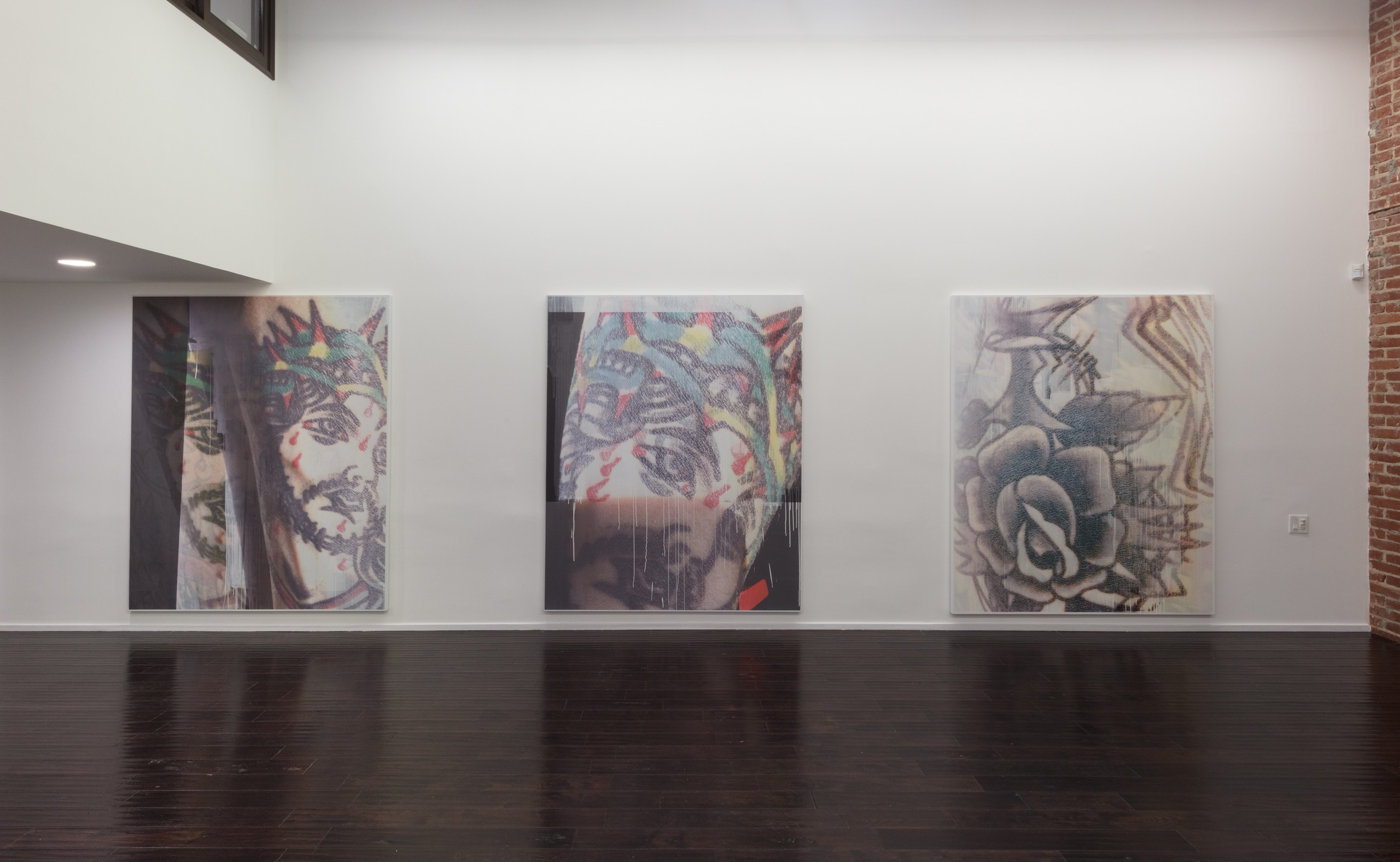
Installation view, 6817 Melrose X SOCIÉTÉ, 6817 Melrose, Los Angeles, 2017
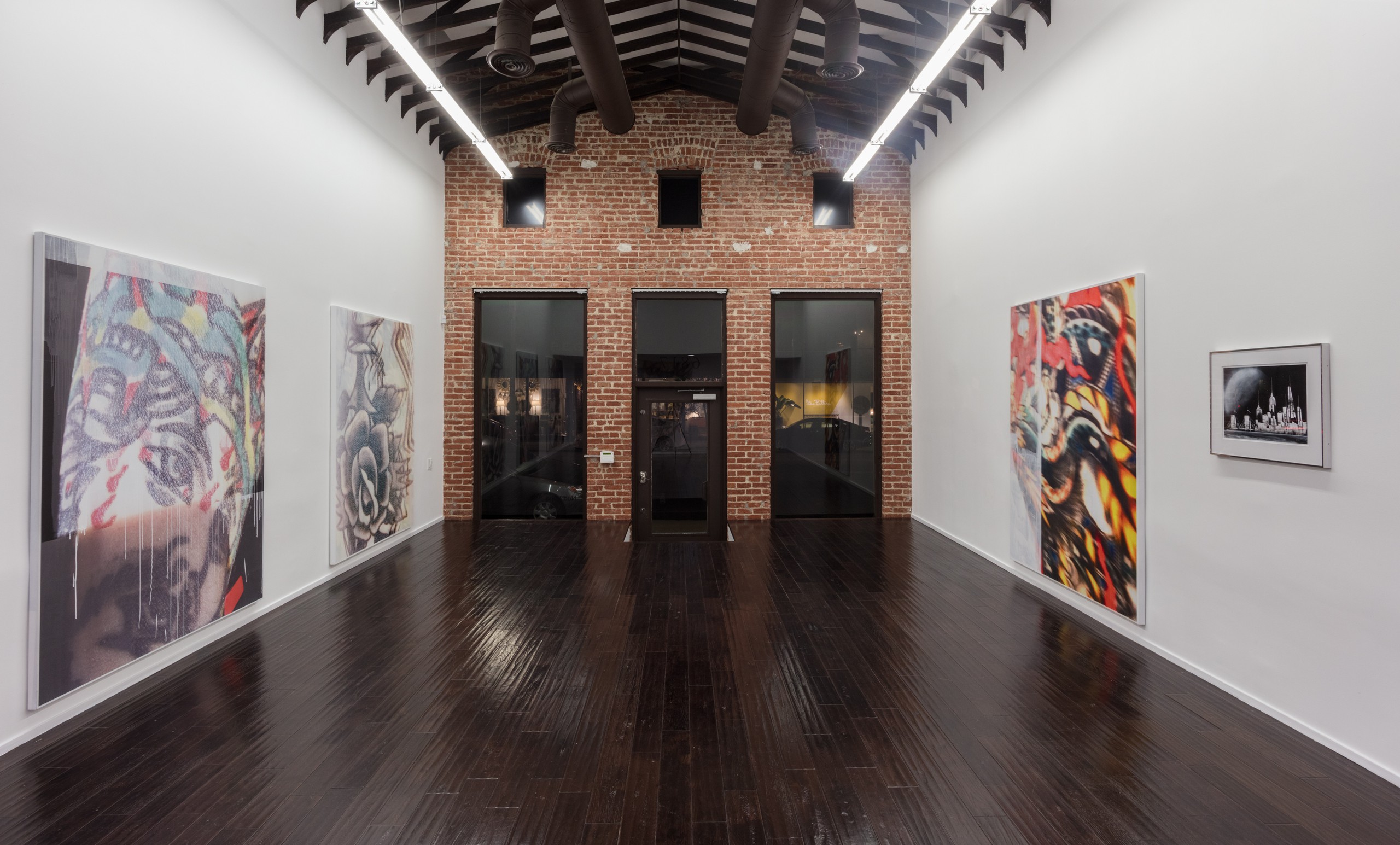
Installation view, 6817 Melrose X SOCIÉTÉ, 6817 Melrose, Los Angeles, 2017

Installation view, 6817 Melrose X SOCIÉTÉ, 6817 Melrose, Los Angeles, 2017
@societeberlin
Société, Berlin 2017
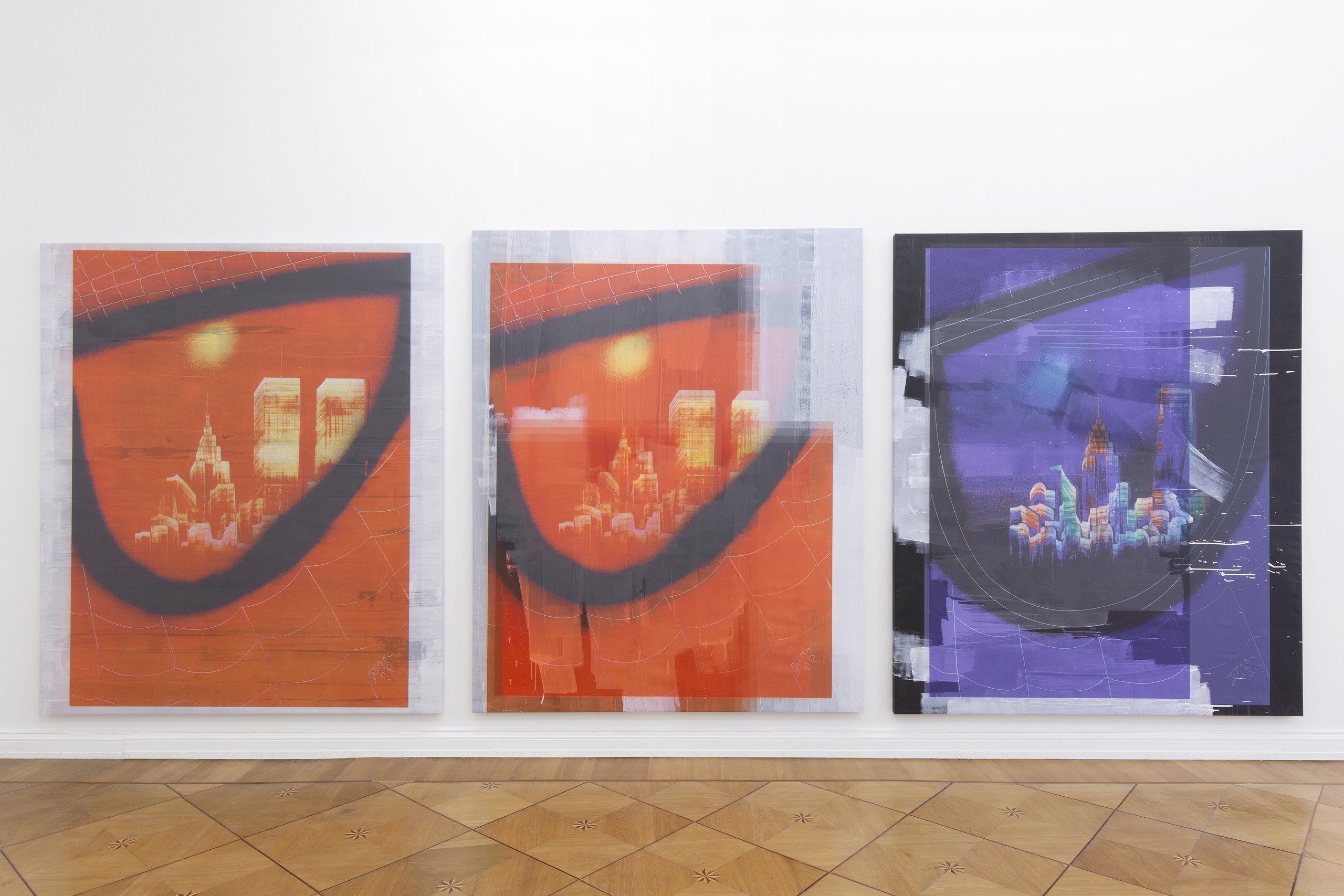
Installation view, @societeberlin, Société, Berlin, 2017
The paintings on view depict the Manhattan skyline, reflected in the eye of Spiderman, in various stages of its existence since the World Trade Centers were finished in lower Manhattan in 1973. These images are printed onto the canvas from digital files made from scans of spray-painted drawings purchased from street merchants, catering to tourists, operating primarily around Times Square. These merchants produce the paintings using spray paint and sell them at a bargain. Their presence in the area is in line with the touters of three-card monte, bucket drummers, rappers hawking mixtapes, and the many other enterprising hustlers that have defined the neighborhood by setting up shop on the busy sidewalks for decades. These drawings are prepared on site and the customer is asked to choose which Manhattan they would like depicted, new or old, to be reflected like a mirror, in the glassy eye of a character from a fantasy. There is a sufficient quotient of magic and speed in the production of these images, making it an efficient street-level hustle. The artists work quickly, using shitty materials to produce effects that develop on the surface of the work like an apparition. Most transactions are done in cash, though some vendors now use Square and so have the capability to accept payment by card.
The motif of the Manhattan skyline has three versions. One version represents the former World Trade Center ‘Twin Tower’ buildings. The Twin Towers’ skyline represents nearly four decades of a city that was consumed by crime, one that Gerald Ford told to ‘drop dead’; a bankrupt New York, at the financial mercy of Wall Street and real estate fat cats. It was an era that culminated with the Giuliani mayoral regime, the so-called ‘Disneyfication’ of Times Square, and the terror attacks of September 11, 2001 when the Twin Towers were destroyed. Another version painted shows the absence of any tower, depicting the nine years between late 2001 and 2010 when the new World Trade Center’s sluggish construction was only halfway to completion and not yet the dominating landmark on the Manhattan skyline. This interim period was one of post traumatic stress. The area around the WTC was given the provisional title “Ground Zero”; architects and engineers struggled to replace the WTC and America invaded Iraq for the second time in thirteen years. The third version painted by the vendors features the completed World Trade Center 1 building, formerly known as “The Freedom Tower” which stands at 1776 feet tall. WTC1 was completed in July of 2012, four months before Barack Obama was elected to his second term as president of the United States. It is the contemporary landmark skyscraper of New York, save for for 432 Park Avenue on “Billionaires Row”, which is the second tallest building in the city. The glassy and geometric facade of WTC1 is representative of the rapid construction and development that has taken hold of New York City in the first decades of the 21st Century.
Also on view are Frottage drawings made by rubbing a conté stick onto paper pressed against cars parked on the streets of Berlin. The cars that acted as surfaces for these rubbings were private vehicles and cargo vans, as well as the shared vehicles owned by companies like Car2Go and Drive Now, that are not exactly private. The conté charcoal stick is a rudimentary drawing tool, made of compressed ash with wax as a binder. Frottage is a Surrealist drawing technique developed by Max Ernst, later to be used by Henri Michaux, Robert Overby and many others. Aside from its use by artists, visitors to colonial graveyards in the United States often make frottage recordings of the elaborate designs carved into the headstones belonging to the people buried there.
As paintings in a gallery, a new dimension of reflection is coded into Spiderman’s view and a different register of fantasy plays out on their surface. The relocation of Spiderman’s eye from the international hub of tourism to a gallery creates new nodes of activity within the hustlers trade network, implicating not only the gallery and the artist, but also the audience into their expanded web. Meanwhile, the logos and names rubbed off of cars bear theunintended potential of relating to the themes of Spiderman, and even art making.
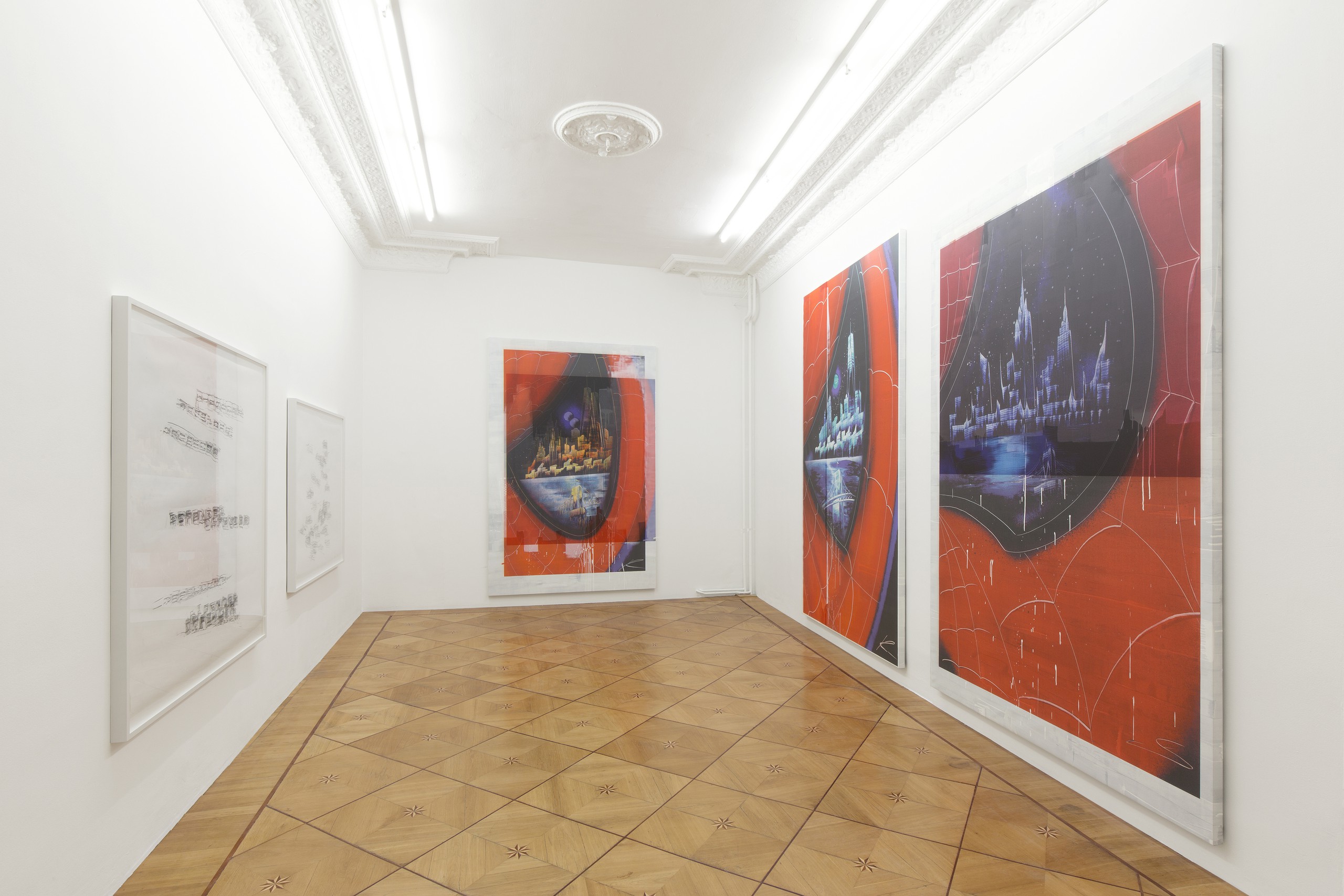
Installation view, @societeberlin, Société, Berlin, 2017
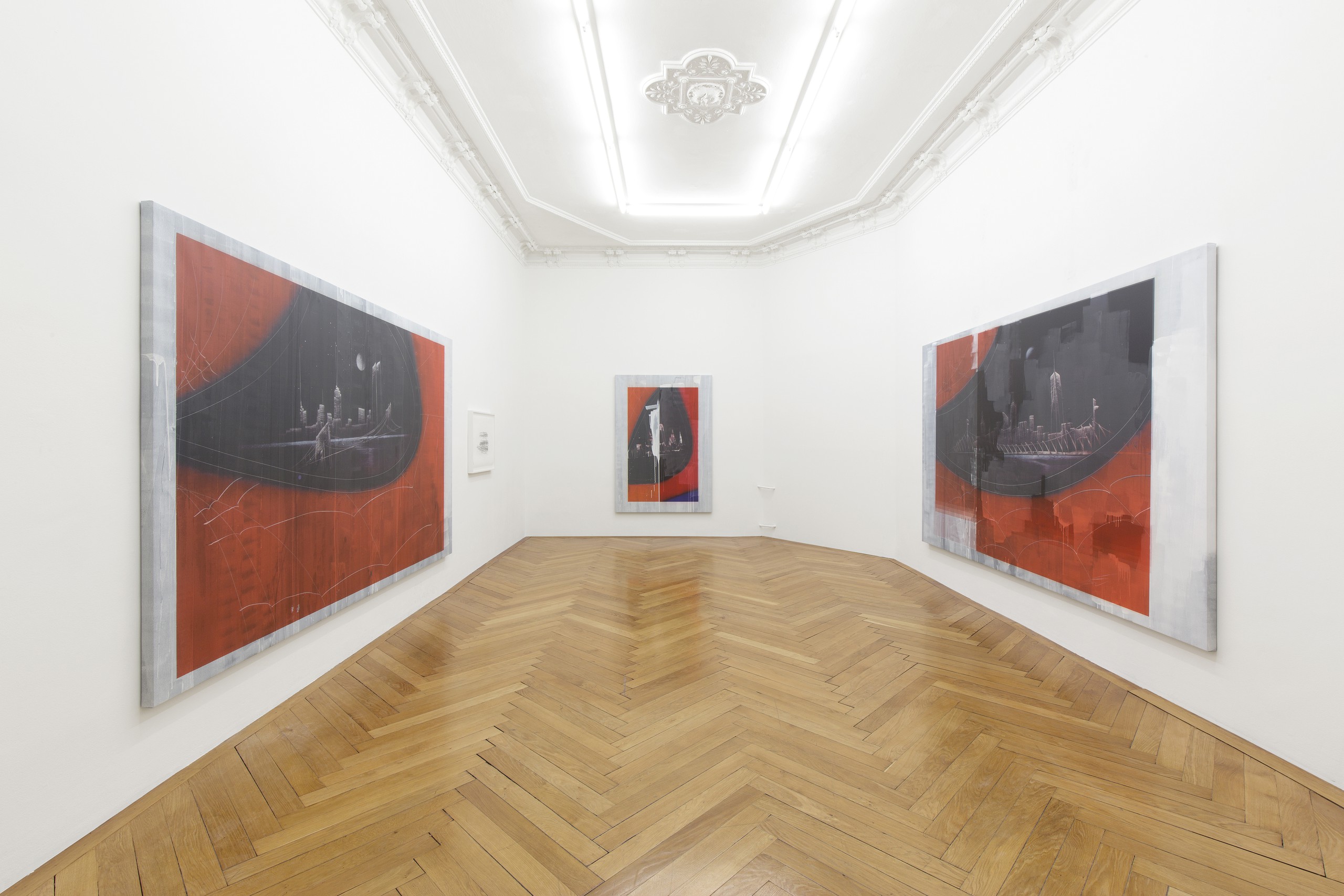
Installation view, @societeberlin, Société, Berlin, 2017
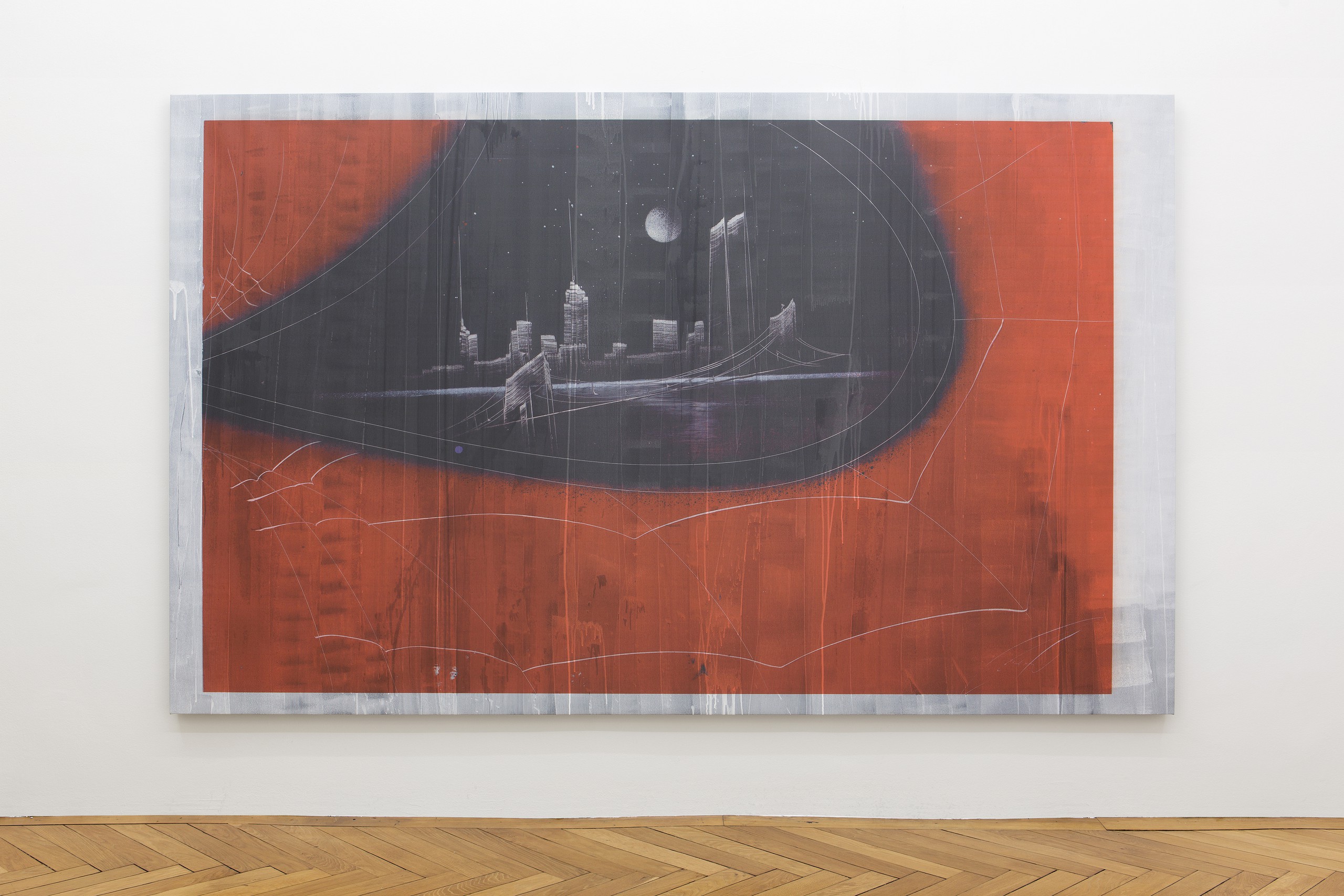
Installation view, @societeberlin, Société, Berlin, 2017
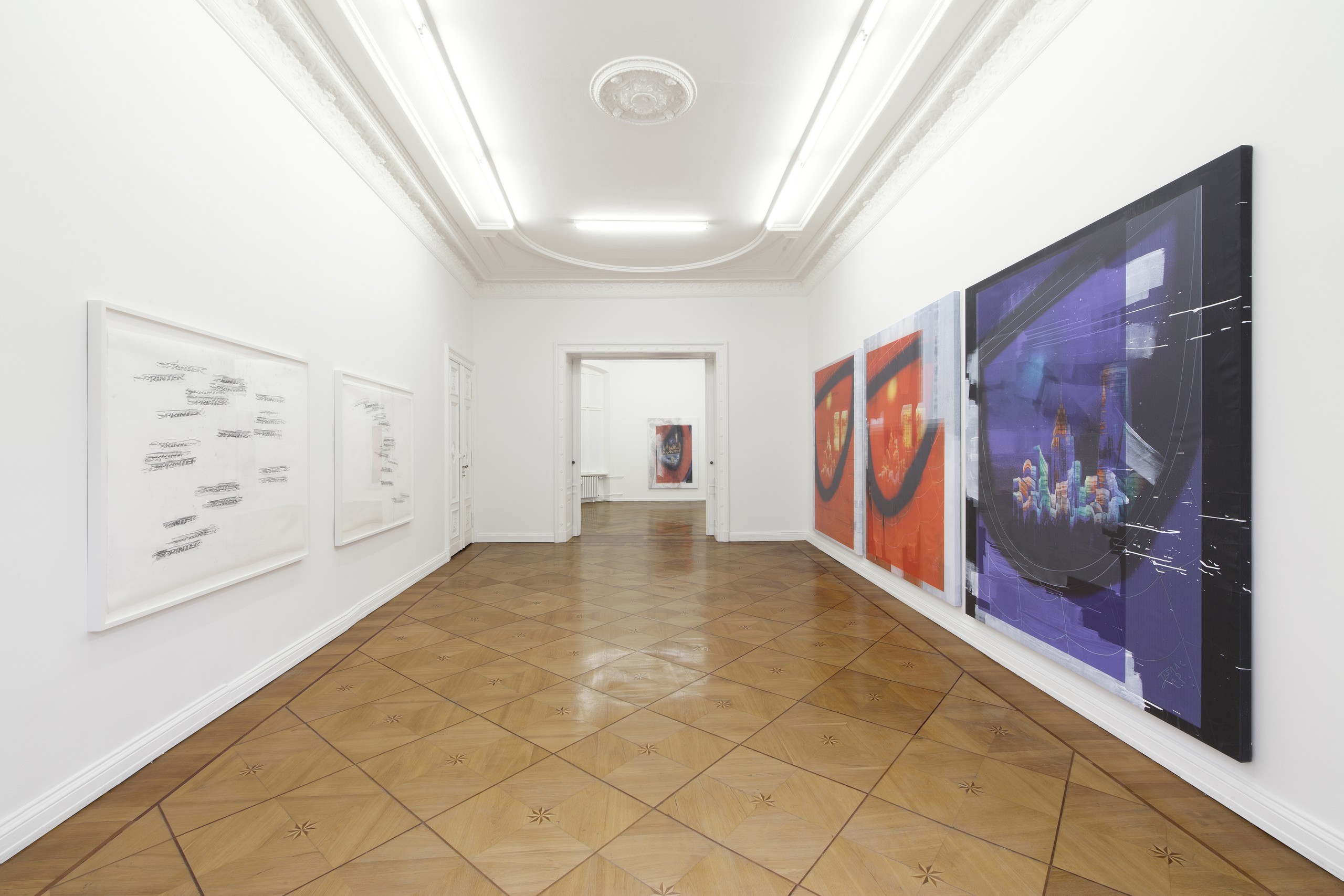
Installation view, @societeberlin, Société, Berlin, 2017
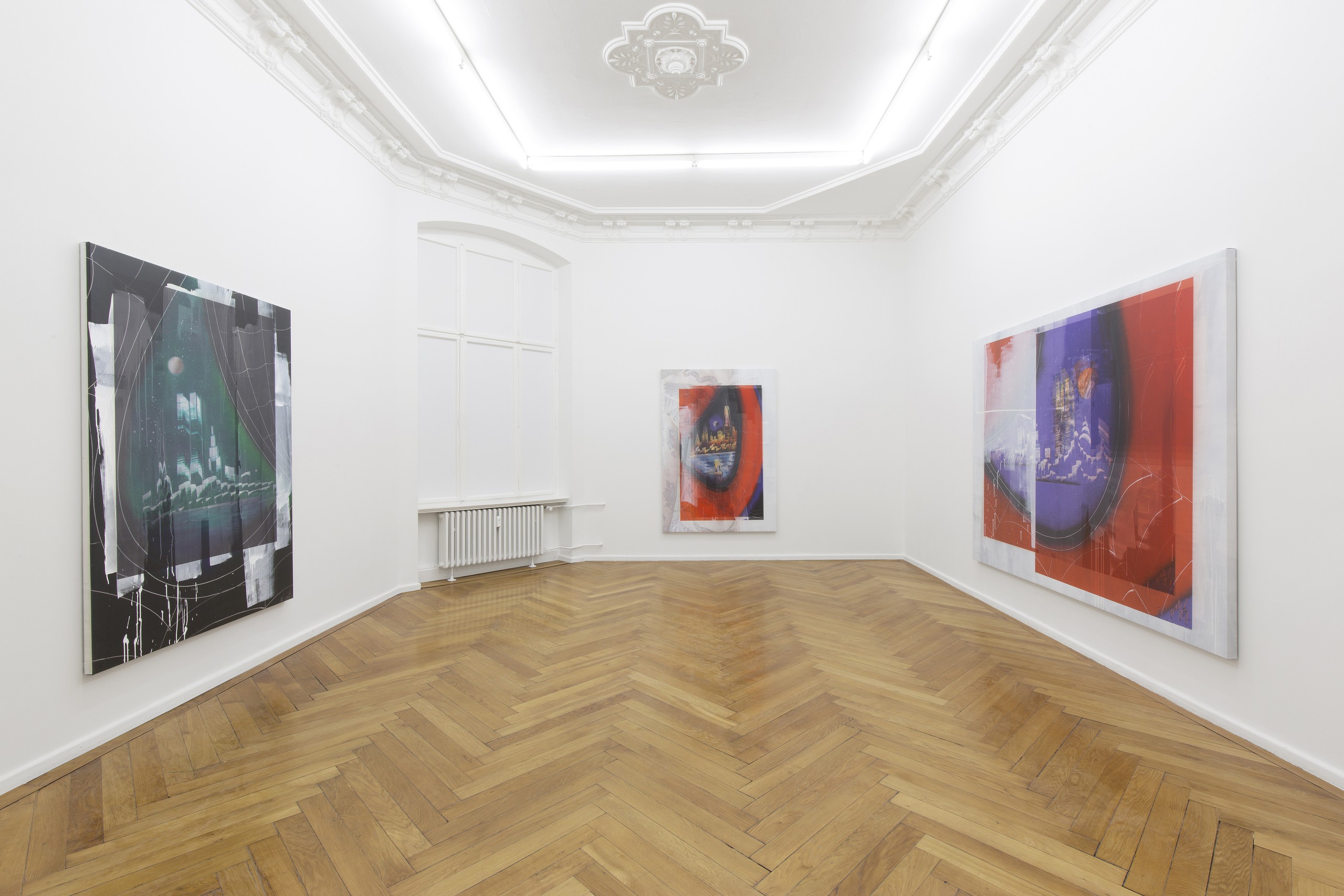
Installation view, @societeberlin, Société, Berlin, 2017
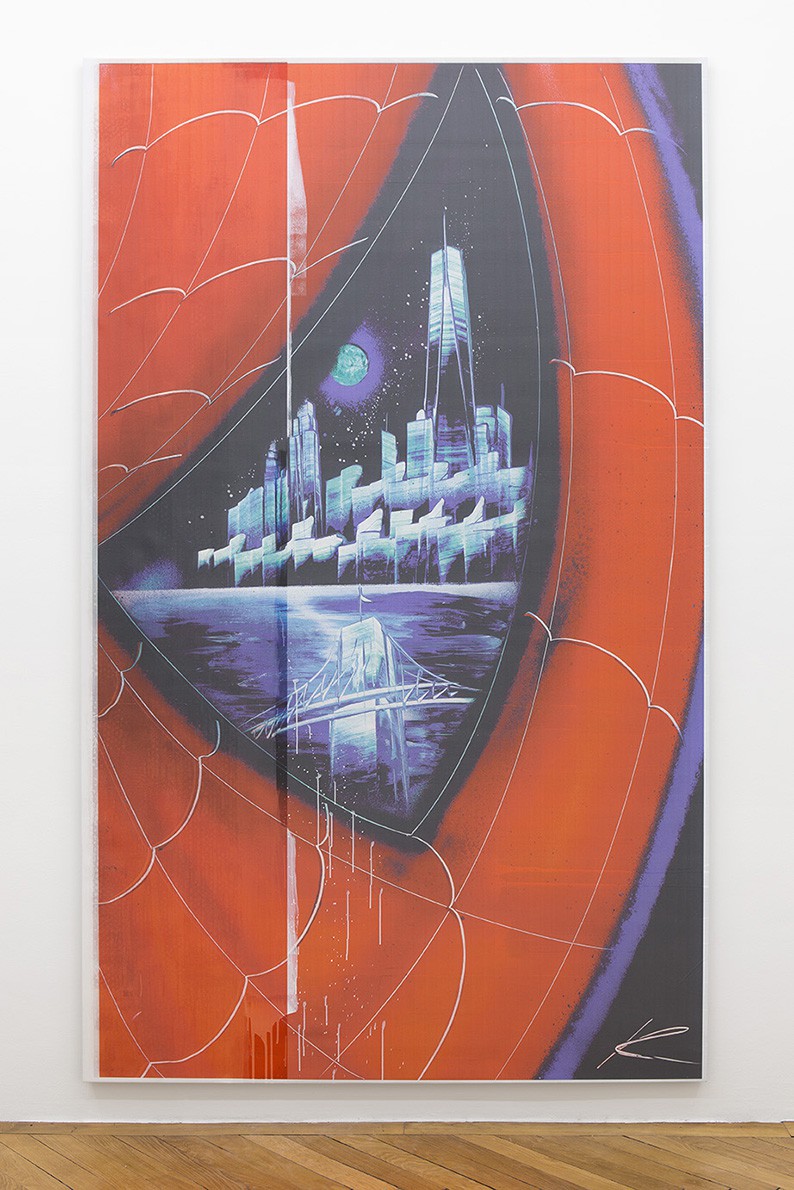
Installation view, @societeberlin, Société, Berlin, 2017
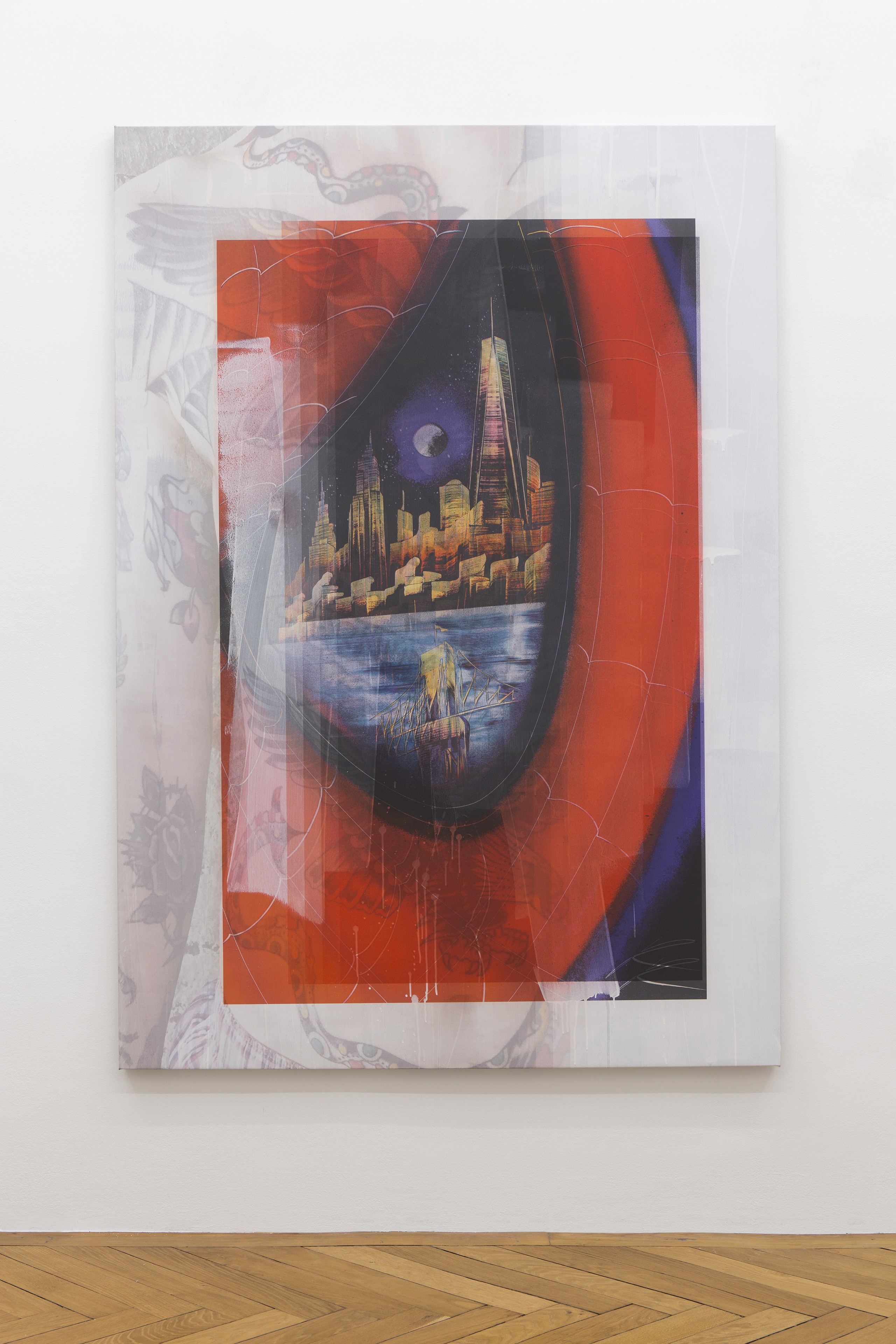
Installation view, @societeberlin, Société, Berlin, 2017
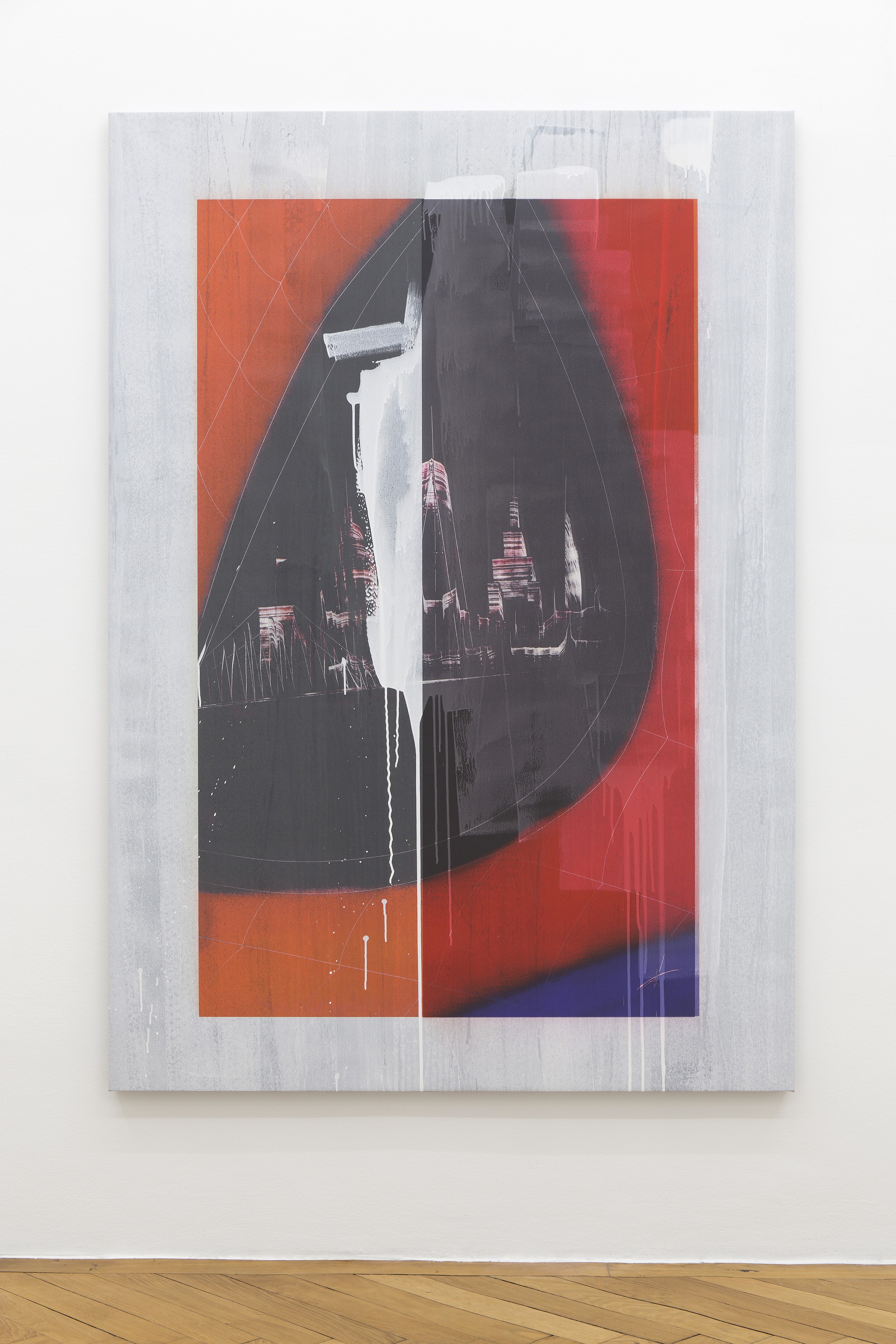
Installation view, @societeberlin, Société, Berlin, 2017
Paintings without Borders 2
Contemporary Art Museum St. Louis, St. Louis, 2016
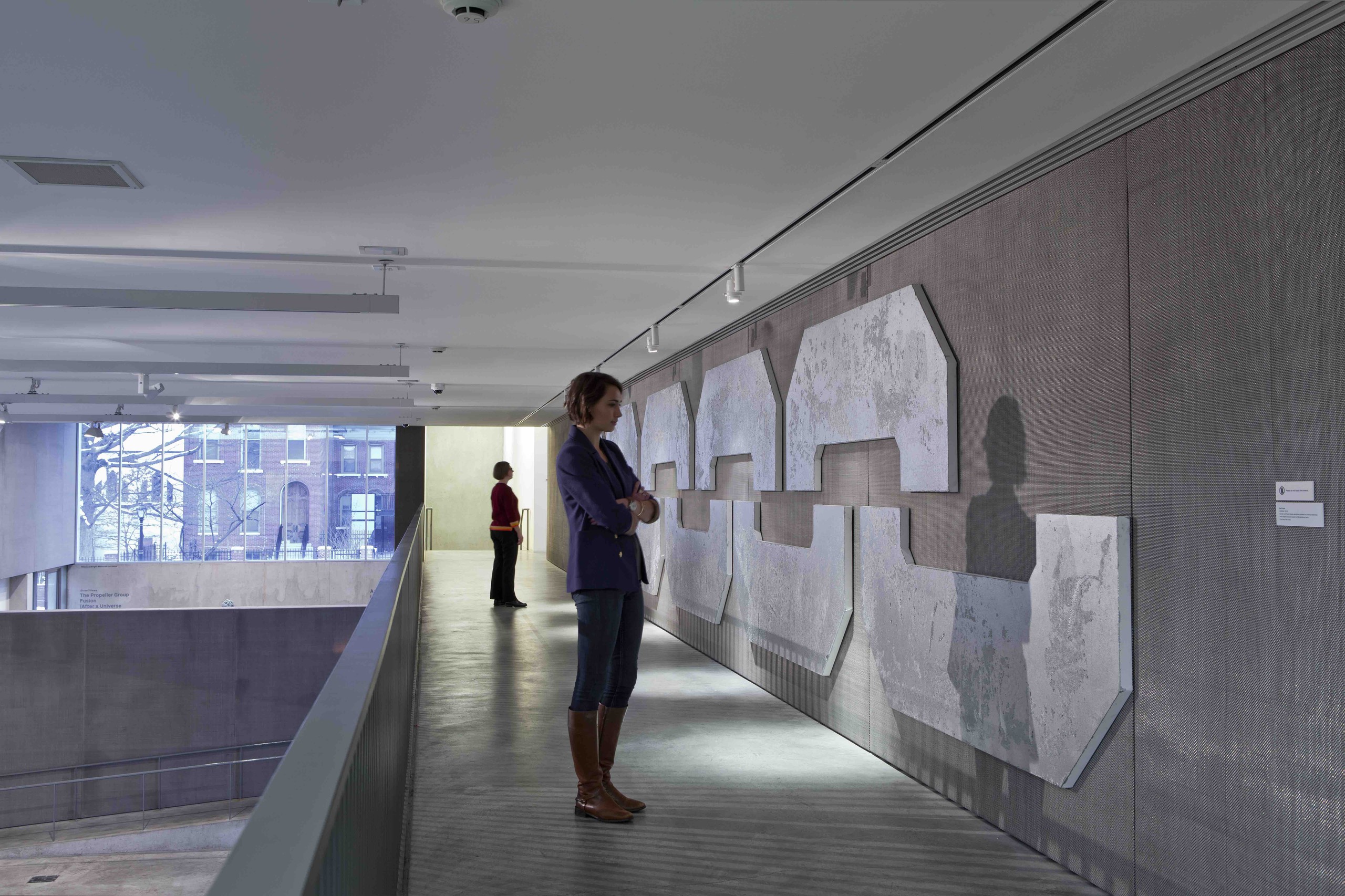
Installation view, Paintings without Borders 2, Contemporary Art Museum St. Louis, St. Louis, 2016
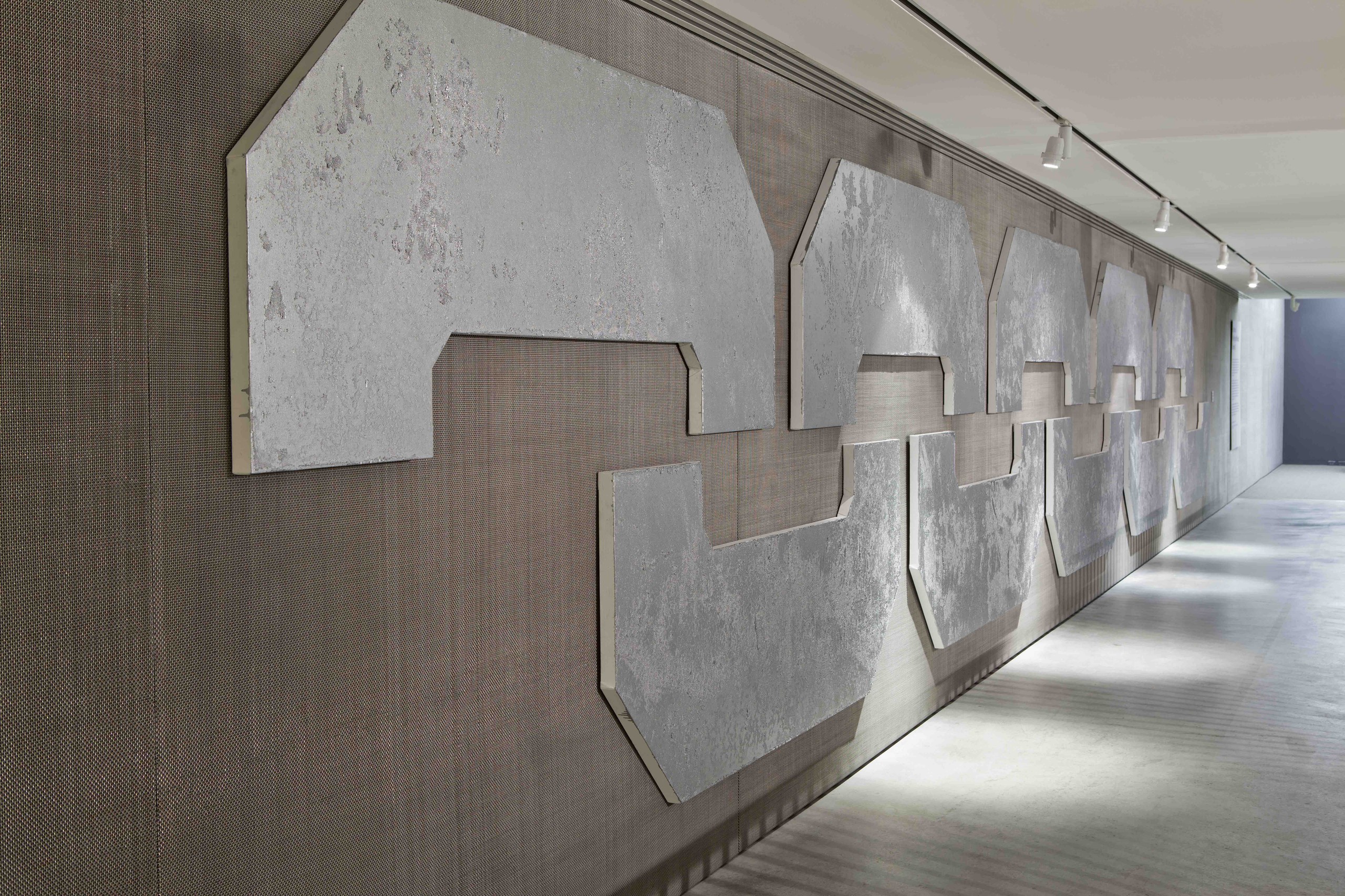
Installation view, Paintings without Borders 2, Contemporary Art Museum St. Louis, St. Louis, 2016
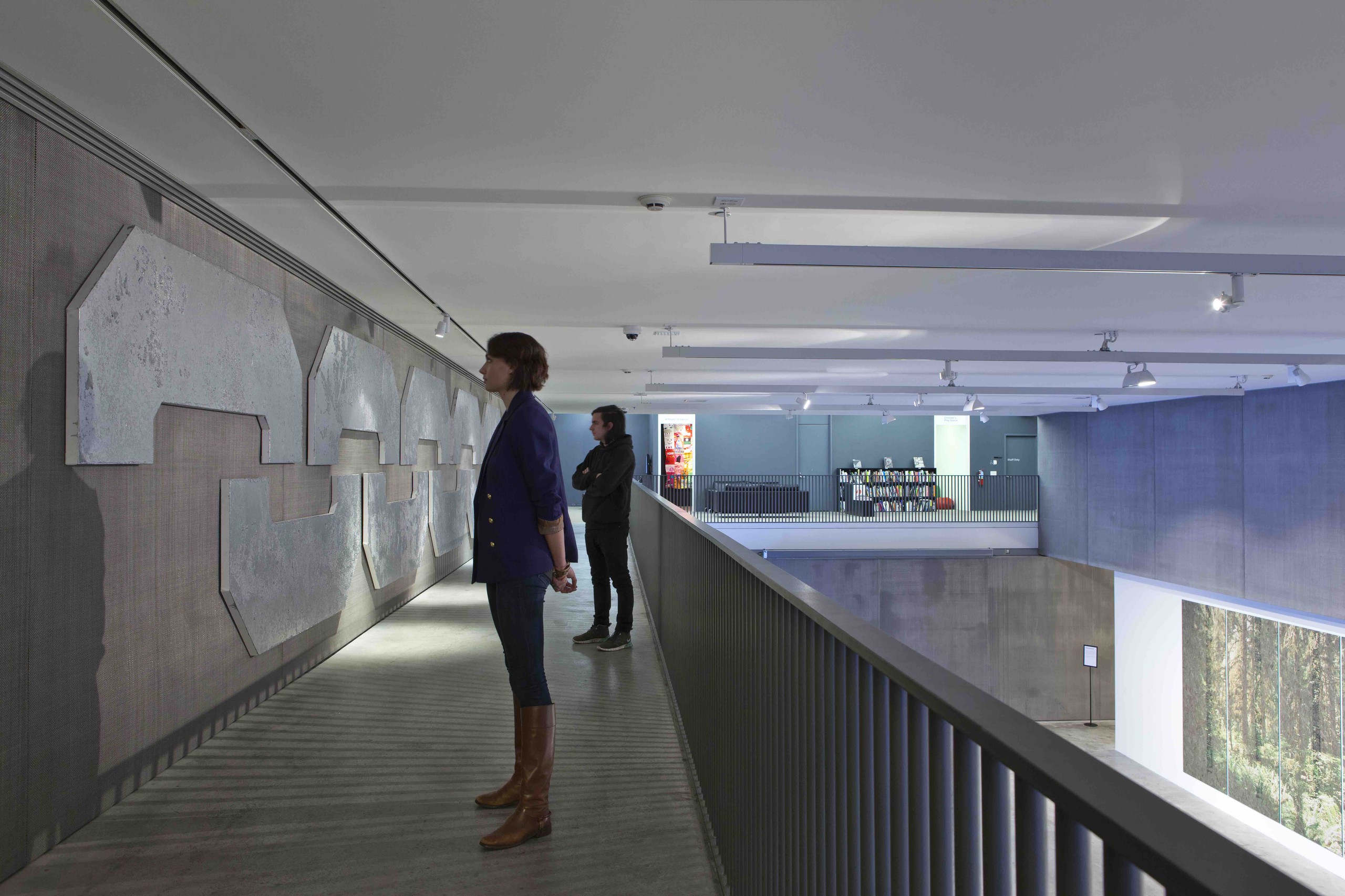
Installation view, Paintings without Borders 2, Contemporary Art Museum St. Louis, St. Louis, 2016
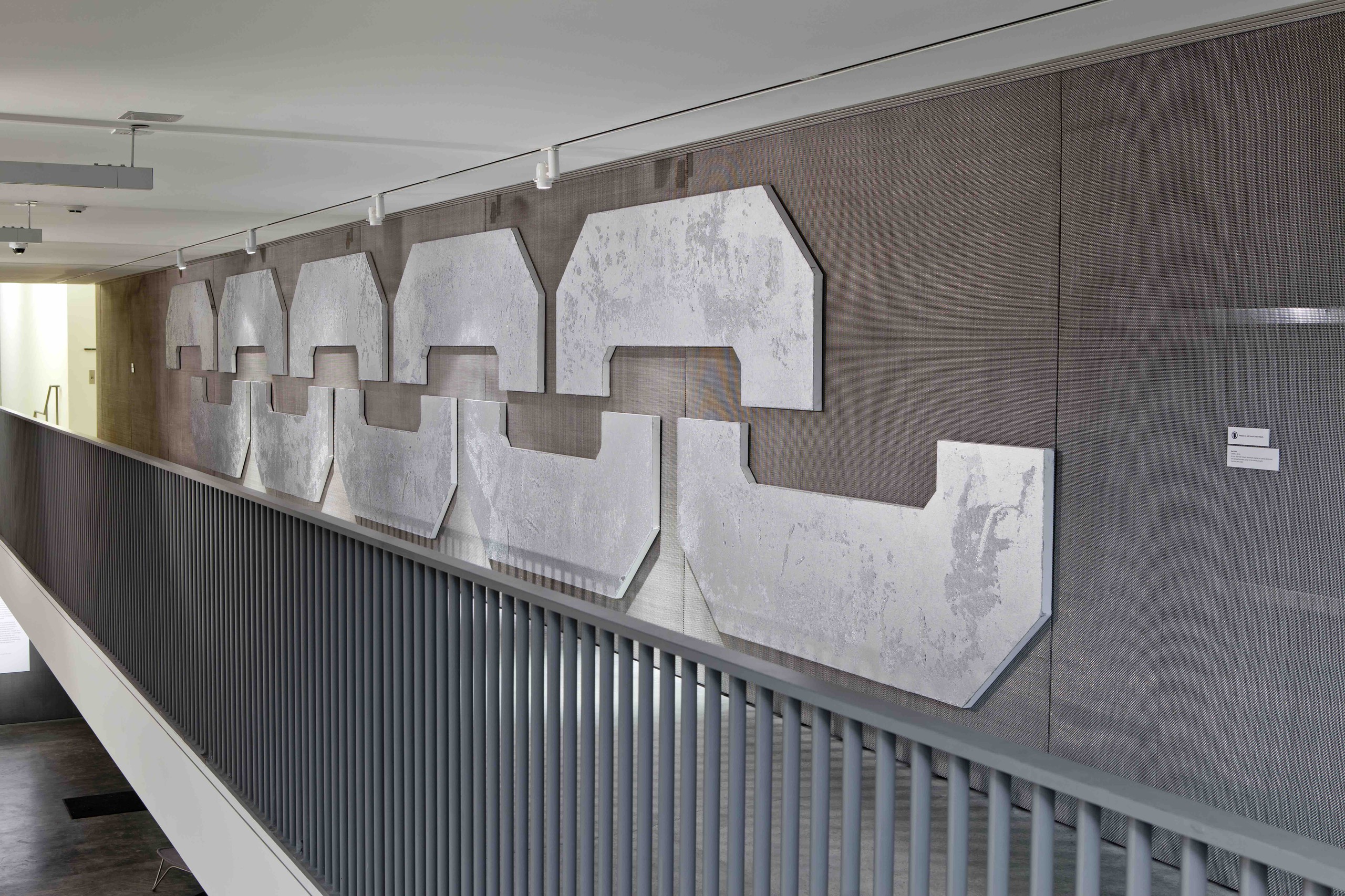
Installation view, Paintings without Borders 2, Contemporary Art Museum St. Louis, St. Louis, 2016
Ned Vena
Solo exhibitions
-
2021
Spirals, Société, Berlin
-
2018
Hell on Earth, Gavin Brown’s Enterprise, New York
FACTS, Project Native Informant, London -
2017
6817, Melrose, Los Angeles
@societeberlin, Société, Berlin -
2016
Control Segs, Ramiken Crucible, New York
Paintings Without Borders 2, Contemporary Art Museum, St. Louis -
2015
Clones, Project Native Informant, London
-
2014
Menace II Société, Société, Berlin
Paintings Without Borders, Real Fine Arts, New York -
2012
Ned Vena, Clifton Benevento, New York
Ned Vena, White Flag Projects, St. Louis -
2011
Ned Vena, Société, Berlin
Ned Vena, Michael Benevento, Los Angeles -
2010
Ned Vena, Max Hans Daniel, Berlin
Ned Vena, Clifton Benevento, New York -
2009
800 Numbers, Midway Contemporary Art, Minneapolis
Ned Vena, Michael Benevento, Los Angeles -
2008
Ned Vena, Galerie Gebr. Lehmann, Berlin
Ned Vena, Cohan and Leslie Gallery, New York
Group exhibitions
-
2018
Condo London 2018, Project Native Informant, London
-
2015
Geometric Obsession, Museo de Arte Contemporáneo, Buenos Aires
Group show, Real Fine Arts, New York
New York Painting, Kunst Museum, Bonn
Seven Artists in Two Rooms, Offsite, New York -
2014
Dizionario di Pittura, Francesca Minini, Milan
Beware Wet Paint, Fondazione Sandretto Re Rebaudengo, Turin
Stars + Stripes: American Art of the 21st Century from the Goldberg Collection, Bathurst Regional Art Gallery, Bathurst
Beware Wet Paint, Institute for Contemporary Arts, London
Collaborative Painting & Text, Algus Greenspon Gallery, New York
Jeanette Mundt & Ned Vena, Federico Vavassori, Milan -
2013
A brief history of spots, stripes and holes, Carlson Gallery, London
Sous l‘Amazone coule un fleuve, FRAC Auvergne, Clermont-Ferrand -
2012
Trojan Horses, Bugada & Cargnel, Paris
Home Again, Again, The Journal Gallery, New York
The Space in Between, Steven Zevitas Gallery, Boston
Minimal Myth, Museum Boijmans Van Beuningen, Rotterdam
Josh Kolbo & Ned Vena, Société, Berlin
Soft OP, Modern Collections, London
Into The Surface, Brand New Gallery, Milan -
2011
Sentimental Education, Gavlak Gallery, Palm Beach
Les Affranchis, Frac Auvergne, Clermont-Ferrand
I don‘t know if it makes any sense – I feel quite dizzy and a little drunk due to the blow. I will return with more info shortly…, Curated by Howie Chen & Tim Saltarelli, IMO Projects, Copenhagen
Summer Whites, Curated by Eddie Martinez and Sam Moyer, Rachel Uffner Gallery, New York
Everything You Can imagine is Real…, Xavier Hufkens, Brussels
One dozen Paintings, The Journal, New York
Curating the Contemporary: Joseph Montgomery & Ned Vena, Kunsthaus Baselland, Basel
Gruppenausstellung 2, Max Hans Daniel, Berlin -
2010
The Power of selection, Western Exhibitions, Chicago
Skins, Curated by Alex Gartenfeld, OHWOW Gallery, Miami
Substance Abuse, Curated by Colin Huerter, Leo König Inc., New York
Metallika, Curated by Patrick Brennan, Monya Rowe Gallery, New York
The Blood of a Poet, Thierry Goldberg Projects, New York
Célébration, Frac Auvergne, Clermont-Ferrand
Mass Ornament, Barbara Gladstone, New York
Shape Language, Nicole Klagsbrun, New York
At the Splendors of the Earth (Part 2), Cave, Detroit
Home grown, The Art Complex Museum, Duxbury -
2009
Gruppenausstellung, Organised by Max Hans Daniel, Autocenter, Berlin
Nothing I to say and I am Saying it, Kunstverein Freiburg, Freiburg
If the Dogs are Barking, Artist‘s Space, New York
Maximal Minimal, Primo Piano, Lugano
From the collection of…, White Columns, New York
Group Show, Cave, Detroit
This is not the Striezelmarkt, Galerie Gebr. Lehmann, Dresden -
2008
Blue Sky, Galerie Gebr. Lehmann, Dresden
B Seite, Galerie Gebr. Lehmann, Berlin
Psych, Galerie Dennis Kimmerich, Düsseldorf
Back to Black, Schwarz in der aktuellen Malerei, Kestnergesellschaft, Hannover
Cube Passerby, Organised by Michael Caputo and Gavin Brown, Passerby, New York -
2007
Ilya Lipkin, Sean Raspet, Ned Vena, Organised by Arnd Seibert, Cohan and Leslie, New York
On View: Selections from the BC Project Room permanent collection, BC Project Room, New York
Untitled (Perfect Lovers), BC Project Room, New York -
2006
Attic, Anton Kern Gallery, New York